
LOCOMOTIVE JOURNAL
JANUARY 2016
New Year, new hope, new fears
We face the New Year, as always, full of hope and aspiration but aware of the many
challenges ahead, not only in protecting our terms and conditions, but industrially and
politically.
The government’s decision not to protect our steel industry, while other countries support
theirs, makes us think not only of the workers and families affected but also the supply chain, and transport of materials, and finished product, and the implications for rail freight as we await decisions on future contracts.
The Trade Union Bill, signalling the end of a democratic voice for millions of people, has
passed in the Commons and now we have to campaign against it in the Lords.
Industrially, we welcome investment in new trains, but not at the expense of other grades.
Investment should improve service and safety, not reduce dwell times and put greater strain
on the driver. We shall not be supporting D.O.O. where the E.C.determines it does not fall
within existing agreements or is new. That decision is underlined by two incidents that make
a mockery of any pretension the industry has to safe running. The first is the prosecution of a conductor in Liverpool, exonerated by company and industry investigations, and our sister
union has our backing in this travesty. The second, which is subject to a number of high level meetings as this edition of the Journal goes to press, is an R.A.I.B. report that says we can no longer rely on traction interlock and have to subsequently check again. This makes a
nonsense of the safety case for D.O.O. and means we should be in degraded working,
depending on getting out and checking every door individually. Much better to have a guard
on every train and every platform properly manned.
In the case of sliding door stock, with a guard at unmanned platforms, trains should not run
because once the conductor has done the platform check, stepped inside, closed the local door and engaged interlock, how would they do the subsequent visual check? We were sold
interlock on the basis you cannot get power if there is an obstruction or the brakes come on; if it is lost, better or more sensitive technology, not poor guidance, has to be the solution!
Yours fraternally
General Secretary
LOCOMOTIVE JOURNAL
JANUARY 2016
UNION SAYS NO GO DOO
A.S.L.E.& F. and the R.M.T have told Britain’s privatised train operating companies that there will be no extension of Driver Only Operation - whatever it is called, and whatever the initials are employed - on the railway network in this country. In a fierce warning shot across the bows of the T.O.C.s, and the Department for Transport, Mick Whelan, General Secretary of A.S.L.E.& F. and Mick Cash, General Secretary of the R.M.T.,said:
We are completely opposed to Driver Only Operation and its forms, including Driver Controlled Operation and Driver Door Operation, throughout the network. We firmly believe this method of operation is less safe for passengers and the workforce and our unions ill not agree to the extension of D.O.O. or D.C.O. or D.D.O. under any circumstances. This includes recent proposals for D.O.O. by Great Western in respect of the the new I.E.P. trains and the government’s proposal for D.C.O. for the next Northern Rail franchise.
“The responsibility of the driver of the train is to drive, which requires 100% focus. it is less safe for the driver and for passengers if the driver is distracted by additional duties such as protection the platform interface. The guard/conductor should retain responsibility for door operation.
‘We are particularly concerned, for example, that there have been a number of incidents in the last year across all sectors where even more pressure has been placed on drivers, rather than questioning the of D.O.O.
We are also opposed to D.O.O. and D.C.O. and D.D.O. because its introduction would remove the current guarantee that passengers will always have a safety critical second person on the train who can not only deal with emergencies but also provide general reassurance and assistance to passengers.
It is essential for the safety of both the driver and the passengers to have the guarantee of a guard/conductor on the train to protect the driver and the passengers in the event of driver incapacity. This was demonstrated by a recent incident at Sutton Weaver where a driver received a severe electrical shock and was assisted by the guard, who was able to call for the emergency services, and accompany a doctor who was travelling on the train to provide emergency first.
With record passenger numbers we now need more, not fewer, rail staff. Services for passengers should be improved by investment in modern railway infrastructure and rolling stock - not by dismissing and deskilling guards and placing even more responsibilitiy on the driver.
We will campaign in unity to oppose any extension of D.O.O., D.C.O. and D.D.O. and to seek to explore ways of reversing it where it has been introduced. Thus will include making our views clear to employers, government and other politicians.
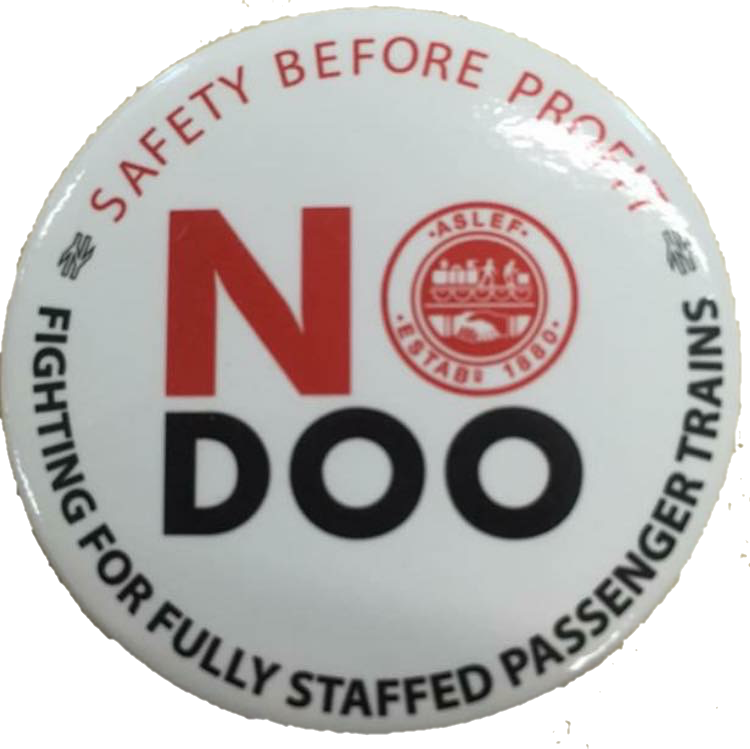
Show your support for the No DOO campaign with these ASLEF badges available free from head office.
Brighton A.S.L.E.F. Members (Southern) Picket Lines at Brighton Station on Tuesday 13th December 2016DAY 1
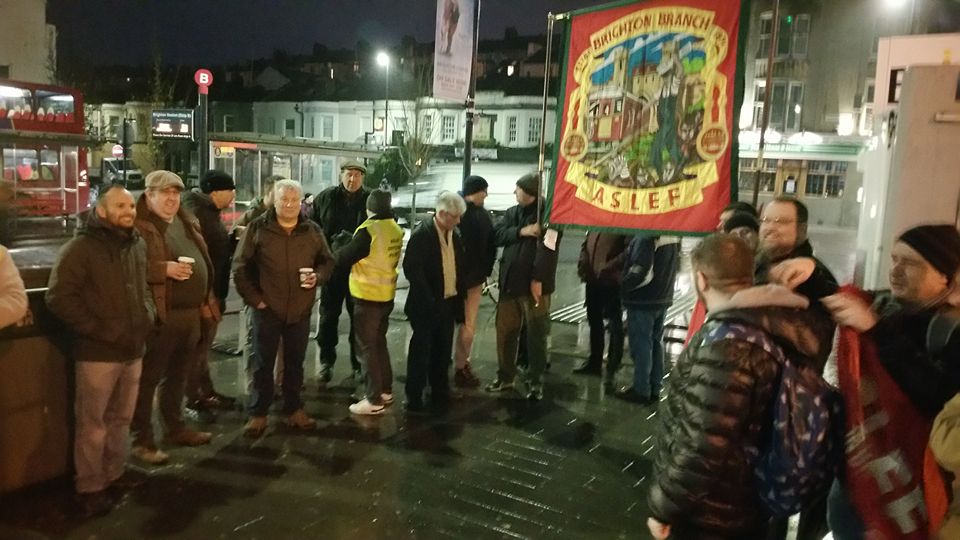
ALAN KIRBY COLLECTION
LOCOMOTIVE JOURNAL
APRIL 2016
Wilko raises the bar for railway pay talks
I want to thank all those working for our members in Freightliner and D.B.S. hit by the serial effects on the freight sector of the loss of steel and coal traffic. This loss – 16% plus in areas already economically depressed – is a bitter pill to swallow for the whole supply chain. Every officer and company council member is working hard to ensure those impacted are given every opportunity to stay on the railway.
The Shaw report flirts with further fragmentation of the railway to offset investment debt.
There is talk of selling off 18 major stations so Network Rail can concentrate on its core
business. Rumours abound about the sale of the overhead line structure, and communications structure, of the railway. None of this makes economic or operational sense.
Meanwhile the competition authority, endorsed by the O.R.R., suggests breaking up inter-city routes to encourage open access.
More madness! Interesting, of course, that it’s only on lines that generate a surplus. These
must be the only bits of the railway that need more – albeit smaller – geographical
monopolies?
And we have Peter Wilkinson of the DfT, on £265k a year, publicly declaring that he is going to rip up the contracts of all those £60k a year three days a week train drivers?
Apparently we all have big cars and credit cards and will crawl back after a couple of days on strike. To my knowledge there are no £60k a year three days a week drivers but maybe this base line of his should be the basis of all our future pay claims? We could call it the Wilkinson formula!
More importantly, is this DfT policy or did Wilkinson go rogue? We have asked the Transport Secretary to comment and asked what he is going to do about this person. And we reserve the right to take action if any driver suffers abuse or assault arising from his lies. As I said during the Night Tube and junior doctors disputes, they use this dirty tactic of demonising people publicly to damage their terms and conditions and futures. I wonder, is it our turn again?
Finally, I was overwhelmed by the massive support to allow me to continue as general secretary of our trade union. The numerous messages and endorsements, both within ASLEF and the wider movement, left me truly humbled and more determined not to let you down.
Deepest thanks, as I see this as recognition of the work all of us in A.S.L.E.F. do together.
General Secretary
Brighton A.S.L.E.F. Members (Southern) Picket Lines at Brighton Station on Tuesday 13th December 2016DAY 1
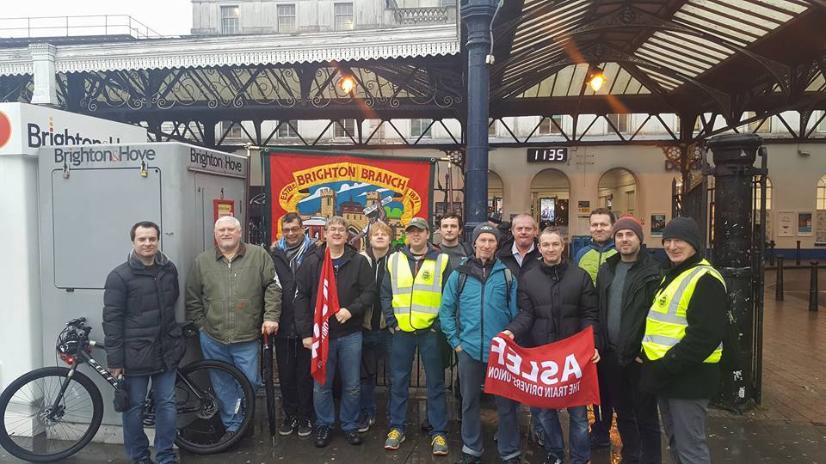
ALAN KIRBY COLLECTION
LOCOMOTIVE JOURNAL
APRIL 2016
Wilko raises the bar for railway pay talks
I want to thank all those working for our members in Freightliner and D.B.S. hit by the serial effects on the freight sector of the loss of steel and coal traffic. This loss – 16% plus in areas already economically depressed – is a bitter pill to swallow for the whole supply chain. Every officer and company council member is working hard to ensure those impacted are given every opportunity to stay on the railway.
The Shaw report flirts with further fragmentation of the railway to offset investment debt.
There is talk of selling off 18 major stations so Network Rail can concentrate on its core
business. Rumours abound about the sale of the overhead line structure, and communications structure, of the railway. None of this makes economic or operational sense.
Meanwhile the competition authority, endorsed by the O.R.R., suggests breaking up inter-city routes to encourage open access.
More madness! Interesting, of course, that it’s only on lines that generate a surplus. These
must be the only bits of the railway that need more – albeit smaller – geographical
monopolies?
And we have Peter Wilkinson of the DfT, on £265k a year, publicly declaring that he is going to rip up the contracts of all those £60k a year three days a week train drivers?
Apparently we all have big cars and credit cards and will crawl back after a couple of days on strike. To my knowledge there are no £60k a year three days a week drivers but maybe this base line of his should be the basis of all our future pay claims? We could call it the Wilkinson formula!
More importantly, is this DfT policy or did Wilkinson go rogue? We have asked the Transport Secretary to comment and asked what he is going to do about this person. And we reserve the right to take action if any driver suffers abuse or assault arising from his lies. As I said during the Night Tube and junior doctors disputes, they use this dirty tactic of demonising people publicly to damage their terms and conditions and futures. I wonder, is it our turn again?
Finally, I was overwhelmed by the massive support to allow me to continue as general secretary of our trade union. The numerous messages and endorsements, both within ASLEF and the wider movement, left me truly humbled and more determined not to let you down.
Deepest thanks, as I see this as recognition of the work all of us in A.S.L.E.F. do together.
General Secretary
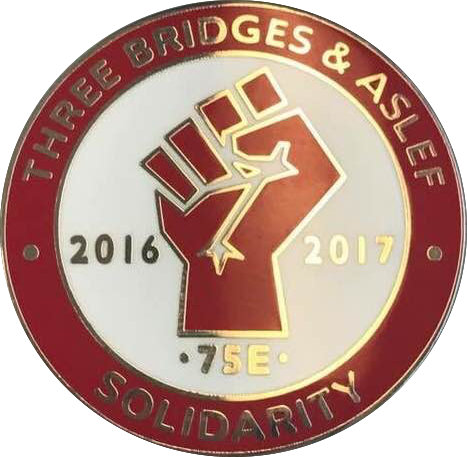
Three Bridges Member (Southern) Picket LineTuesday 13th December 2016DAY 1
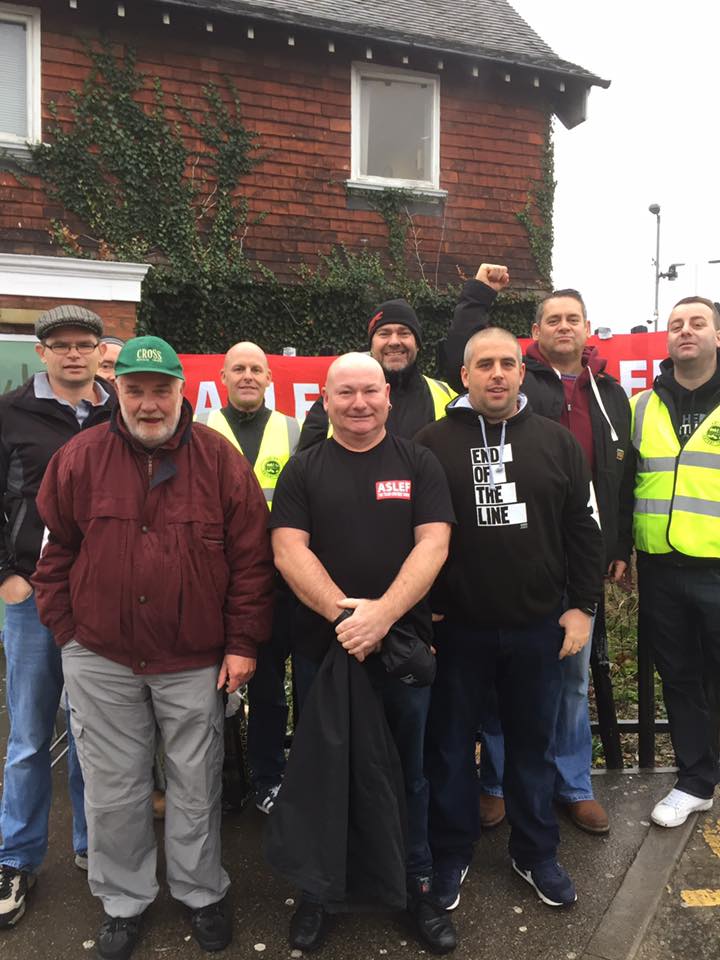
LOCOMOTIVE JOURNAL
APRIL 2016
DfT boss who called drivers ‘muppets’ forced to apologise
Mick Whelan, ASLEF’s general secretary, has forced a government official–who stepped out of line on a public platform – to grovel after he called train drivers ‘muppets’ and told us to ‘get the hell out of my industry.’
Peter Wilkinson, who earns £265,000 a year as director of rail passenger services at the
Department for Transport, faced calls for his resignation after his extraordinary comments at
a public meeting in Croydon, south London. Wilkinson, who lives in Vienna, and commutes
to work by plane, as he prefers not to travel by train, said he was looking forward to ‘punch
ups’ with trade unions over his plans to force through changes to rosters.
Just hours after Mick demanded that Wilkinson withdraw his offensive remarks he offered
this half- hearted apology: ‘I apologise for any offence caused by my comments. I care
passionately about the rail industry and I am committed to helping government deliver a
better rail service for passengers. To do this we need to work with the whole of the rail
industry.’ The DfT added: ‘It is right that Peter Wilkinson has apologised for
his comments.’
But Mick said: ‘This bland unacceptable non-apology does nothing to restore faith or trust in the DfT for those in the frontline who deliver the railway every day.’
Mick has written to Patrick McLoughlin to ask if the Secretary of State for Transport thinks
‘the term muppet is appropriate language to use about staff who deliver the rail services we
rely on every day’ and to ask whether Wilkinson’s views ‘reflect those of the DfT.’
As well as his inflammatory language, Wilkinson told a string of lies – including the claim
that drivers have the same ‘fire break’rest stops as when trains were run on coal – at a
meeting at the town hall organised by Gavin Barwell, Conservative MP for Croydon Central.
He said: ‘I’m furious about it and it has got to change – we have got to break them. They
have all borrowed money to buy cars and got credit cards. They can’t afford to spend too long on strike and I will push them into that place. They will have to decide if they want to give a good service or get the hell out of my industry.’Croydon councillor Jeet Bains, Conservative member for Coulsdon West, happily tweeted: ‘Peter Wilkinson absolutely hammering train drivers. Called them muppets.’
The comments were so bizarre that Sameena Rizwi of the DfT had to deny her boss had been drinking before speaking.
Wilkinson is a controversial figure, disliked at the department but said to have the backing of ministers. His salary is one bone of contention; Wilkinson earns £90,000 more than his boss, the permanent secretary, at the DfT; £30,000 more than the head of the civil service; and £125,000 more than the Prime Minister.
Three Bridges Member (Southern) Picket LineTuesday 13th December 2016DAY 1
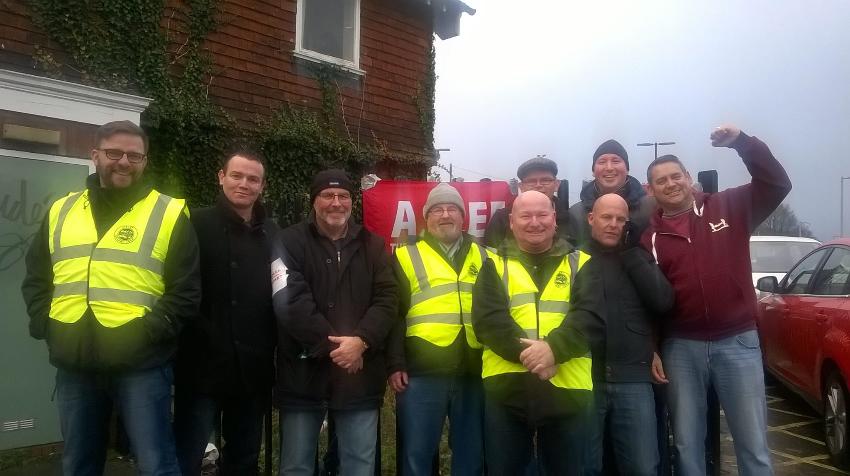
LOCOMOTIVE JOURNAL
APRIL 2016
DRIVER ONLY OPERATION
IS NOT MODERN OR SAFE
We stand on the brink as GTR seems hell bent on imposing DOO and I want to address my fellow drivers on this. It can’t have escaped your notice that TOCs up and down the land are drawing up plans to impose DOO(P). The excuse usually offered is ‘it’s part of the contract agreement’ or ‘the McNulty report’. That report will, in time, be regarded as bad as Beeching; but it does not demand DOO, only recommends it.
DOO is not modern or safe (and there can be no cost put on safety). The reason for DOO is to boost company profits. But drivers need to be left alone to concentrate on driving, in an ever more demanding role, safe in the knowledge that they have with them a fully trained PTS- capable professional conductor/guard who will assist them in an emergency, or who can take charge if the driver is incapacitated.
I’d remind you of our general secretary’s statement that there is to be no extension to DOO(P). And we should be looking to revisit what there already is. Those of you who work DOO(P) were probably never given a choice, but must feel it would be safer to have a guard with you. I urge you to consider this well. Because people in years to come will ask if we did all we could for the good of the railway and the safety of the travelling public?
You will have read that no matter what company policies are in place, the Offences Against the Person Act 1861 can be used by the CPS to prosecute you if someone is killed or injured as a result of your moving train! We need to view with utter disdain the threat to the livelihoods of our conductor/guards. We need PTS qualified conductor/guards on all passenger trains, where they can follow the dispatch regulations, can clearly see the platform and are ready to stop the train in an emergency.
Mike Trodd,
Barnham LSR
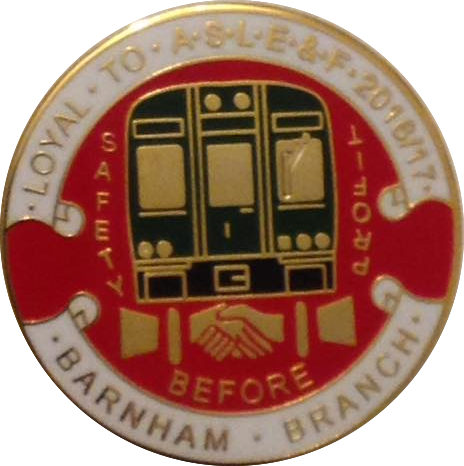
LOCOMOTIVE JOURNAL
MAY 2016
He wants to break us but doesn’t know you
While, on behalf of our members, we try to deal with the uncertainty in the steel industry, it is hard not to have serious concerns for the future of those directly employed. The government’s belated action, to deal with an issue of which they had prior knowledge, is not just woeful and inadequate but negligent; particularly for voting against tariffs to protect our steel industry in light of the increased tariffs the Chinese have announced. car manufacturers are concerned for the future and it has serious implications for the supply chain. As a country, we cannot afford to be at the whim of another nation dominating the market, destroying competition, and then ramping up the price of essential materials in the future.
The Wilkinson affair rumbles on. There is, apparently, no retraction of his lies about £60k a
year three day a week train drivers and we are not aware of any action being taken against
him. But his influence in directing, from his £265k a year seat, the poor ITTs, and the
consequences of seeking to impose conditions outside our agreements, has started on
southern G.T.R. and Gatwick Express with other TOCs gearing up with similar nonsense.
He said he would break us and we have asked the Department for Transport and the government whether this is their policy? surprise, surprise! That question has not been answered. They obviously do not know you, or what you expect from your union.
Yours fraternally
Mick Whelan
General Secretary
Horsham Branch Picket LineTuesday 13th December 2016DAY 1
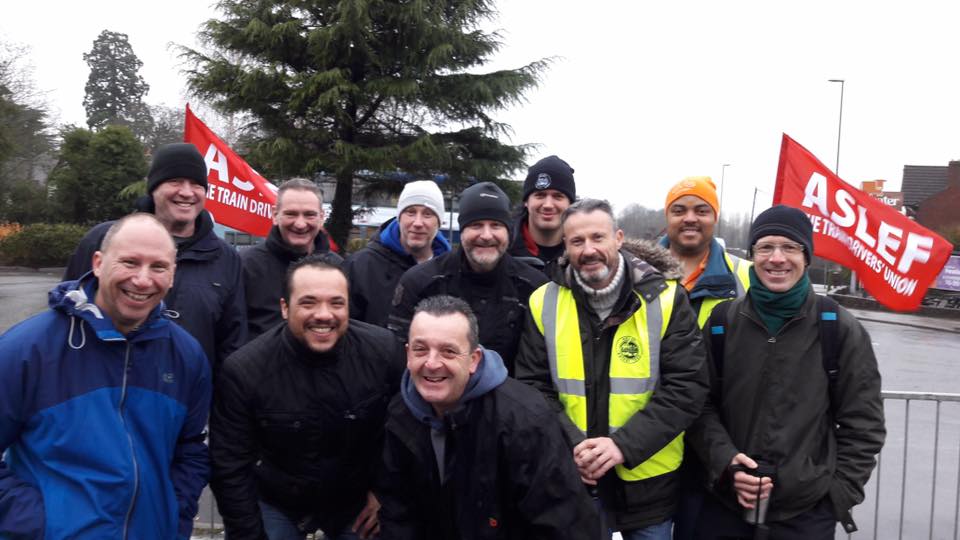
LOCOMOTIVE JOURNALMAY 2016
No go on D.O.O.
Barnham branch was delighted to welcome G.S. Mick Whelan and E.C.1 Marz Colombini to its meeting on Sunday 3 April. Mick delivered a passionate speech regarding current A.S.L.E.F. concerns including D.O.O., the challenges facing our freight sector drivers, the threat to the steel industry, the politics behind protecting our membership, D.f.T. Wilkinson’s attack on our members, and the reasoning behind A.S.L.E.F.’s position on our pensions. Mick took questions from the floor, largely on G.T.R.’s plans to increase D.O.O., and we were left in no doubt that A.S.L.E.F. would not allow any extension. Where there is currently no D.O.O., there will be no D.O.O. Thanks to Mick and Marz for attending, to branch secretary Jeff Turner for making the arrangements, and his wife for providing the high standard buffet.
Mike Trodd,
Barnham
Barnham Branch Picket LineTuesday 13th December 2016DAY 1
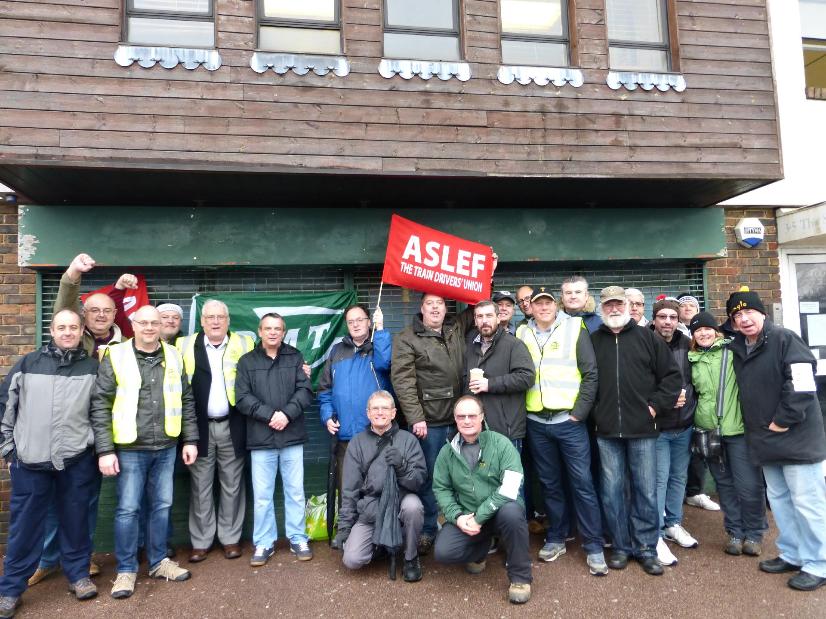
LOCOMOTIVE JOURNAL
JUNE 2016
Standing shoulder to shoulder on D.O.O.
A.A.D. unanimously backed a motion – moved by Chris Sneddon, Wimbledon, and seconded by Andy Cook, Selhurst – calling for a letter of solidarity to be sent to the R.M.T. in their battle over guards’ jobs with G.T.R.
G.S. Mick Whelan said: ‘G.T.R. sent a letter to conductors saying, “We are going to take your jobs away and you may – may! get the chance to apply for another job.”The union got
involved so the company sent them another letter – the worst letter I’ve seen in 20 years –
saying they were taking away their travel facilities and car park places – so how do they get
to work? – if they had the temerity to take industrial action. Then they sent another letter
saying they could sign a new contract with worse t&cs and they – the company – wouldn’t
tell the union. It’s clear what the company is trying to do. They are trying to break the union.’
Chris Sneddon said: ‘They’re coming after the R.M.T. now and they’ll be coming after
A.S.L.E.F. next. We need to stand shoulder to shoulder with our brothers and sisters in the
R.M.T. It's the right thing to do.’
Later, after a long and thoughtful debate, A.A.D. endorsed the E.C. position of no extension
of D.O.O. (whatever it’s called, however the T.O.C.s try to disguise it). Tim van Tinteren,
Sheffield Midland, said: ‘It’s time to draw a line, dig the trenches, and prepare for war.’
Kevin Beresford, Doncaster, argued: ‘The principle of D.O.O. has been lost. We should be
working with our sister union to manage change, and not simply say no, no, no.’
But Dave Calfe, vice-president, persuaded delegates when he said: ‘It’s not just about safety
and it’s not just about risk-assessments. It’s about people’s jobs.’
LOCOMOTIVE JOURNAL
JULY 2016
The dirty tactics employed by G.T.R. Southern, which are a matter of public record, taking
away colleagues’ terms and conditions, and encouraging them to go against their union, has
resulted in a letter from the R.M.T. General Secretary thanking our members for allowing
them to park at their homes and giving them lifts when the company removes staff travel and car parking from them. The government has not removed the contract from G.T.R.
despite it being in default, and it's ever- increasing failures. David Brown, the boss, has had
his pay packet increased to £2 million which is more than the company pays in performance
penalties and Claire Perry, the Rail Minister, has taken to quoting our members’ comments,
from conference, as DfT officials declare war on us. They created this problem: it’s not really about D.O.O, it’s about dwell times; when will they ever tell the truth?
Yours fraternally
Mick Whelan
General Secretary
Eastbourne Branch Picket LineTuesday 13th December 2016DAY 1
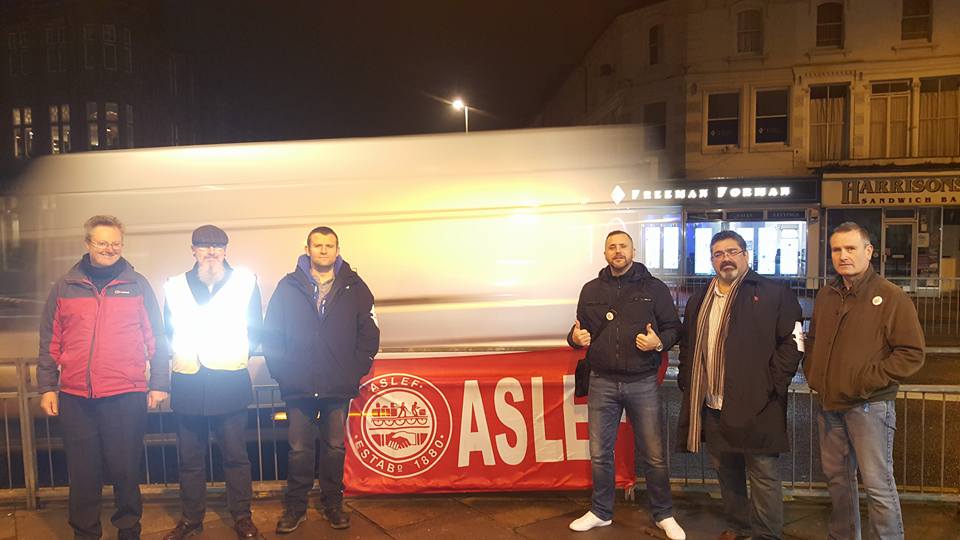
PAUL DONNELLY COLLECTION
LOCOMOTIVE JOURNAL
JULY 2016
Perry under pressure as Tories say
‘GTR is taking us for a ride’
MPs grilled Southern Rail bosses at Westminster amid mounting anger over delays and
cancellations. They laid into Southern’s ‘hapless’ management and the company’s
‘unacceptable’ performance.
Tim Loughton, Conservative MP for East Worthing & Shoreham, said: ‘They are doing a
rubbish job, and need to get their act together. We had loads of excuses but very little about
the effect on passengers. Train companies get a franchise to deliver passengers from A to B,
and clearly Southern are not doing it. I think they are taking passengers for a ride,
unfortunately not literally.’
Southern, a brand name used by Govia Thamelink Railway, runs train services from Sussex
and Kent into London, as well as regional services in the south of England. They have come
under fire for severe delays, cancellations and trains skipping stations. Only half its services
arrived on time in April, significantly lower than the national average of 91.3%. Passengers
have called on the DfT to strip GTR of its franchise before it expires in 2021.
Maria Caulfield, Conservative MP for Lewes, said: ‘We need immediate action. This was
made very clear to GTR and I will continue to pressure Rail Minister Claire Perry to sort this out.’ Caroline Ansell, Conservative MP for Eastbourne & Willingdon, called on G.T.R. to halt planned changes, changes to staff in a bid to spare rail passenger.
Brighton A.S.L.E.F. Members (Southern) Picket Lines at Brighton Station on Wednesday 14th December 2016Day 2
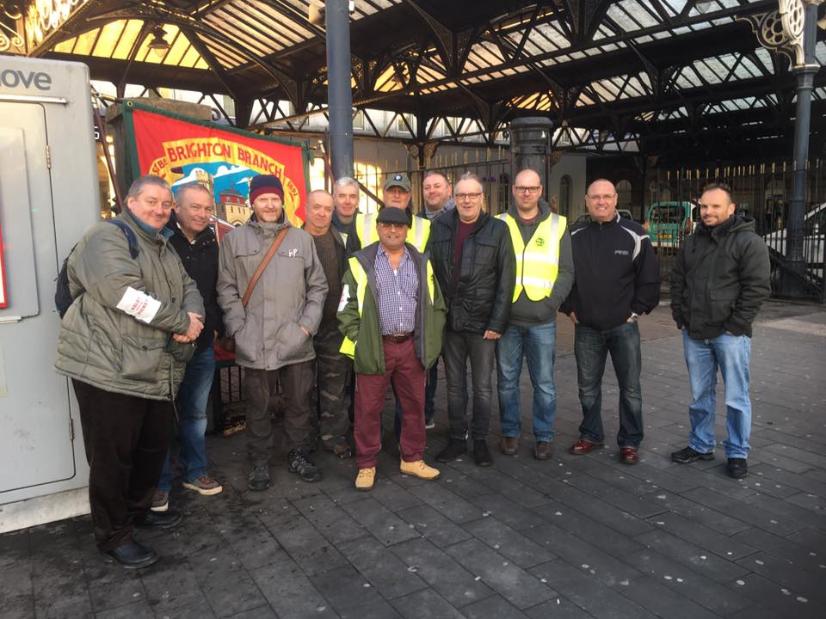
RAY PENNICK COLLECTION
LOCOMOTIVE JOURNAL
JULY 2016
Southern got in trouble when, on its official Southern Rail UK Twitter account, a customer
services manager admitted, in answer to customer’s query.
The original damming tweet about delays: ‘With longer units drivers are not able to see the
full length [sic] of the train and are unable to dispatch [sic] safely.’ Senior managers realised
this admission – correct, of course – was just what ASLEF and the R.M.T. have been saying.
They subsequently deleted the tweet, leading passengers to complain about censorship.
“Southern are losing the plot,” said AGS Simon Weller. “It begs the question, if train are
being short formed for safety, because of lack of guards, why are they hell bent on imposing
12 car D.O.O.?’
Three Bridges members (Southern) Picket Line
Wednesday 14th December 2016
DAY 2
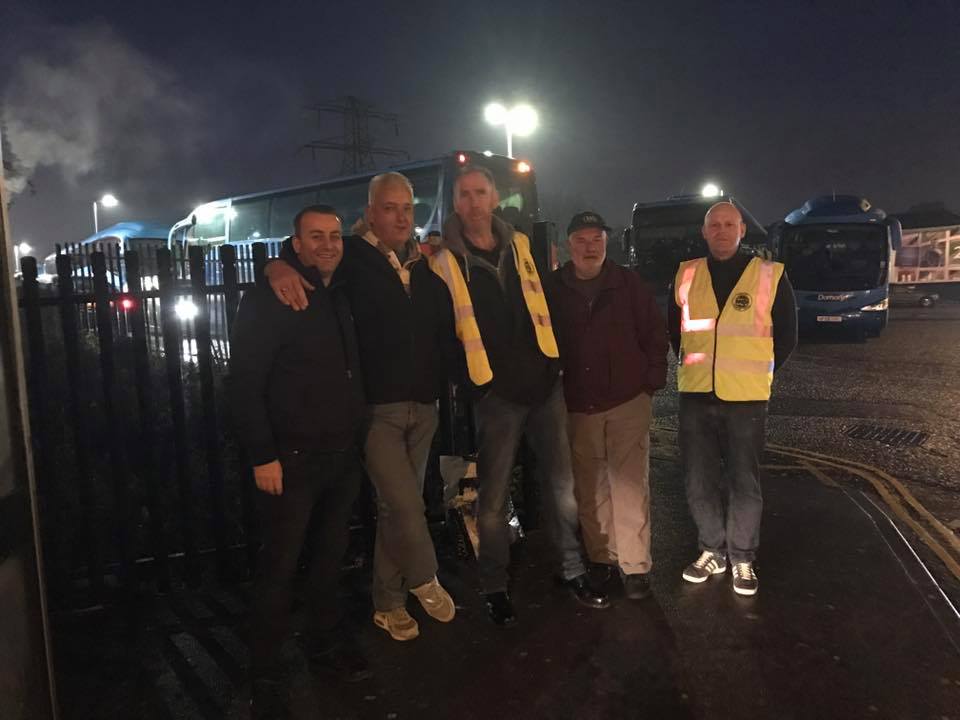
IAN HUNT COLLECTION
LOCOMOTIVE JOURNAL
AUGUST 2016
Prime Minster condemns
‘unacceptable’ service on Southern Failways
David Cameron, in one of his last acts as Prime Minister, answering a question from Jeremy
Quin, Conservative MP for Horsham, at PMQs, slammed the performance of Southern
Railways – branded Southern Failways by fed- up commuters – as ‘unacceptable.’ London
Mayor Sadiq Khan has called for the franchise to be taken away from GTR and handed to
TfL. And passengers have been handing out flyers headlined ‘Urgent Appeal: Have you seen
this woman?’ with a photo of Claire Perry and the hashtag ‘Where’s Claire?’ because the then Rail Minister went missing in action.
- - - - - - - - - - - -
I DREAMED I SAW JOE HILL LAST NIGHT
GREGOR GALL examines how capricious and rapacious employers are using the courts – and the Conservatives’ anti-union legislation – to push back workers’ rights.
ASLEF has found itself at the sharp, and costly, end of the Conservative anti- trade union
laws in the last few months. Twice Govia Thameslink Railway applied for, and was granted,
an injunction to prevent industrial action by members over the use of 12-car rather than 8-car operation. The bases of the granting of the injunctions were the allegations of the absence of a legitimate trade dispute; inducing drivers to take action before balloting; and incorrect members being balloted.
In the case of the second injunction, costs of £250,000 for the employer were awarded against A.S.L.E.F.
CAPRICIOUS EMPLOYERS
Of course, these were not the first or only times in recent years that ASLEF has been up in
court for trying to take industrial action to protect the safety of the travelling public and the
terms and conditions of its members. There have also been cases with London Midland and
London Underground.
Since 2010, when the Conservatives returned to power, and until this summer, 42 injunctions have been applied for by employers – with the overwhelming majority being granted. In addition, 43 threats to make applications for injunctions have also been issued by employers. Again, the outcomes have been overwhelmingly favourable – for the employers – with action being called off or ballots stood down.
The number of applications for injunctions and threats to apply for them are well down on
previous highs in the 1980s and 1990s. Yet what is noticeable is that the applications, and
threats to apply, are increasingly concentrated in a small number of sectors of the economy.
Of the 42 applications since 2010, 23 (55%) have been in transport, communications and
emergency services. Of the 43 threats, 21 (49%) have been in transport, communications and emergency services. And what is startling is that 83% of all those applications for injunctions in the sectors of transport, communications and emergency services were actually in transport alone.
And the punchline is that well over half of the applications for injunctions concerning
transport come from the railway (overground and underground) sector. ASLEF and its sister
union, the RMT, have been the targets of these injunctions.
So what explains this concentration on the rail sector? Capricious minded and rapacious
acting employers are one obvious factor – but there are plenty of those outside the rail sector
so this cannot be the clincher. Even within the rail sector, there are also plenty of occasions
when employers do not run to the courts. The current driver only operation dispute between
the RMT and ScotRail is a case in point – although here ScotRail is using other means to try to undermine strike action by the RMT.
AGGRESSIVE MANAGEMENT
A far more convincing explanation is that employer applications for injunctions highlight a
coincidence of aggressive management and effective industrial action. In other words,
employers are only really concerned about industrial action that has the capacity to halt or
seriously disrupt their operations and, thus, their revenue and their profits.
That is something of a backhanded compliment from employers as the vast majority of strikes do not have this capacity. Those that do have the characteristics of having an immediate effect where there are no existing stockpiles; few alternatives; the goods or services are perishable; and supplies of strike breakers do not exist.
Using this as a rule of thumb explains why there are now few groups of workers, other than
train drivers, and train crew, that have the power to stop employers – if you’ll excuse the pun – in their tracks. Bus drivers are one and Royal Mail postal workers are another.
What does all this mean in the ‘brave’ new world of the Trade Union Act 2016? It was passed by Parliament on 4 May this year. ASLEF members are unlikely to be troubled by the new statutory thresholds when they come into effect later this year (once the commencement orders are issued). This is because turnouts in ballots for industrial action are in excess of a simple majority and majorities for action are also above the additional threshold for transport where the majority for action must also equate to being above the threshold of 40% of all those entitled to vote voting for action.
BACKHANDED COMPLIMENT
That’s another backhanded compliment to ASLEF members. But – and the ‘but’ is a very big one indeed – it still does not alter the fact that the Tory anti-union laws of the 1980s onwards will continue to operate as they have before. The interpretation of them may even tighten as judges establish new precedents.
The task of removing these laws from the statute book remains as pressing as ever and the
only possibility of that happening is the re-election of a Labour government with a policy to
do so. This means, of course, a Labour Party led by Jeremy Corbyn.
For A.S.L.E.F., the same is true for returning rail to public ownership. Only then will the likes of G.T.R. be held in check before being done away with altogether.
Three Bridges members (Southern) Picket LineWednesday 14th December 2016DAY 2
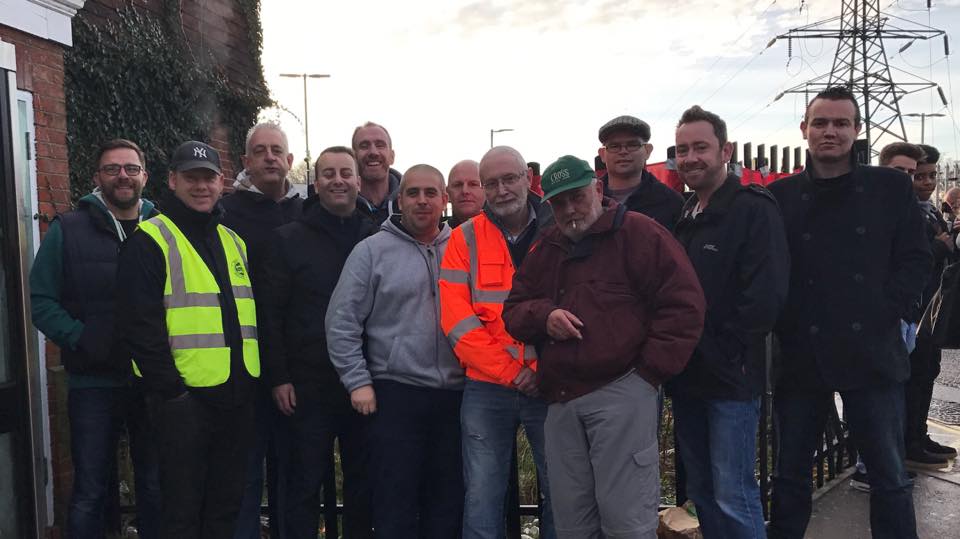
LOCOMOTIVE JOURNAL
SEPTEMBER 2016
PASSENGERS’ SOUTHERN DISCOMFORT
Angry passengers piled more pressure on under-fire Southern boss Charles Horton at a meet
the managers session in Victoria station. The GTR CEO said commuters had been ‘very
honest’ when expressing their frustration with the dismal service – the delays, cancellations
and reduced timetable – his company provides.
Rona Hunnisett, a charity worker who commutes from Brighton to London, complained that
when she asked for ‘a definitive time’ that services would improve, she received only ‘waffle and evasion.’ She added: ‘I’m sick of the constant excuses. I pay Southern £4,000 a year for a service I don’t get.’
Paul Maynard, the new Rail Minister, has said the current level of service the TOC is offering is unacceptable.
And Caroline Lucas, Green Party MP for Brighton Pavilion, said: ‘The level of disruption has been immense, and enough is enough. The way in which the strike has been handled
demonstrates, yet again, that GTR is not fit for purpose. It’s time to strip them of this
franchise and put this rail line in public hands. The government has the power to listen to
passengers, remove the franchise from GTR, freeze fares and compensate people fairly.’
Horsham Branch Picket Line
Wednesday 14th December 2016
DAY 2
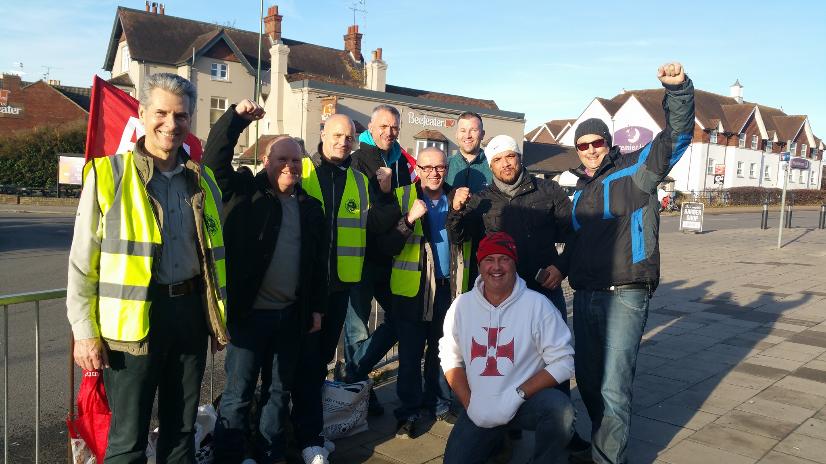
LOCOMOTIVE JOURNAL
SEPTEMBER 2016
GAME ON FOR SOUTHERN FAILWAYS
Web developers frustrated by continuing delays on Southern railways – the company dubbed
Southern Failways by long- suffering passengers – have used their ordeal as inspiration for a
new online game which ridicules the TOC and its ‘rubbish’ management. Tens of thousands
of angry commuters have downloaded ramJam’s game Southern rail Tycoon – the aim of
which is to stop guards from boarding trains so services are cancelled and ‘boom’ profits are
picked up from passengers. once a sufficient number of train guards board a train and a
delayed service eventually departs, the player loses the game. A Southern rail spokesman
said: ‘It’s nothing to laugh at.’
Barnham Branch Picket Line
Wednesday 14th December 2016
DAY 2
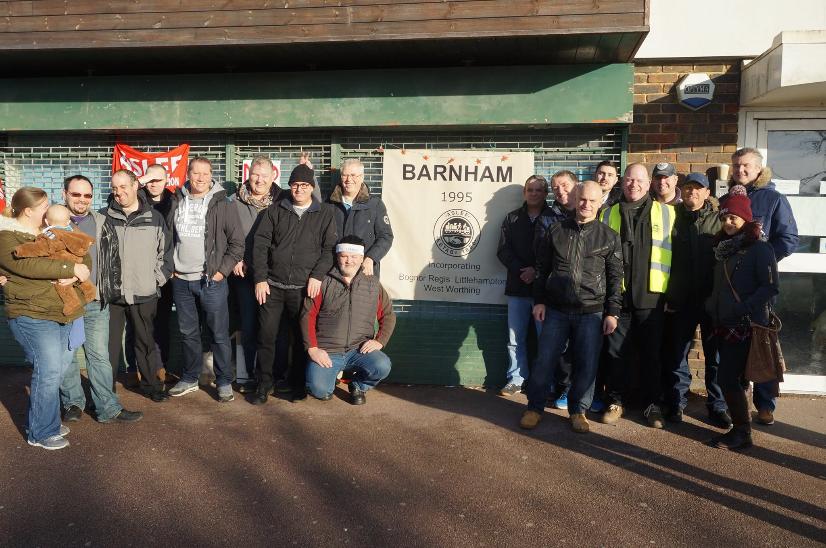
LOCOMOTIVE JOURNAL
OCTOBER 2016
Angry commuter hacks station display board
A disgruntled passenger hacked into a public display board at Blackfriars station to vent his
(or her) anger in novel fashion.
An image of the prank, posted on Reddit, shows the board displaying a Bing search page
entitled ‘Thameslink are s***.’ Some commuters wondered, online, how someone had
managed to hack into the board while others were more concerned about the hacker’s choice
of search engine. ‘Seriously,’ wrote Kraven 420, ‘Who uses Bing?’ Another user gTr proudly promotes the Thameslink are s*** search page on reddit replied: ‘Thameslink, apparently.
Explains a lot.’ A Thameslink spokesman said: ‘This display board has been hacked by a
person or persons unknown. We are investigating how it was possible for this to happen.’
Brighton A.S.L.E.F. Members (Southern) Picket Lines at Brighton Station on Friday 16th December 2016DAY 3
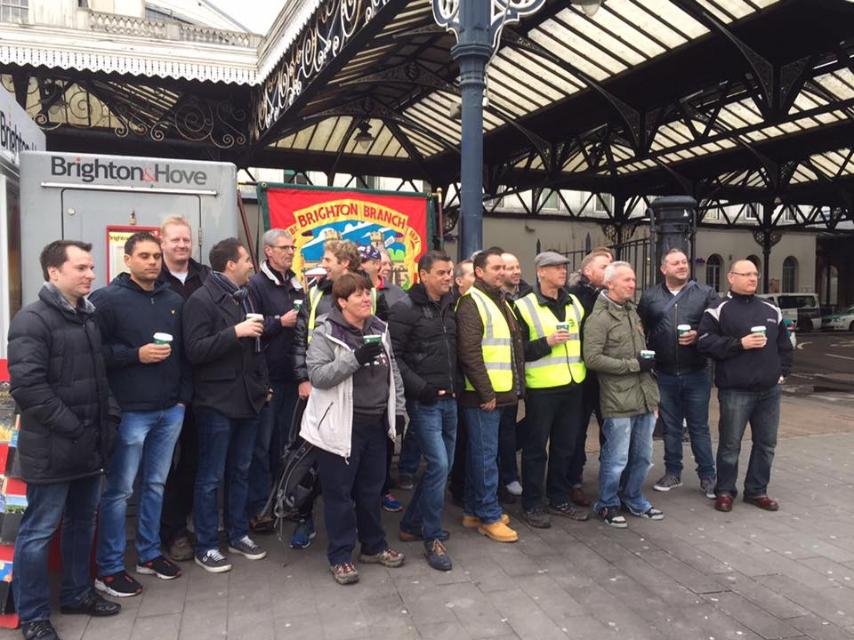
RAY PENNICK COLLECTION
LOCOMOTIVE JOURNAL
OCTOBER 2016
SOUTHERN PASSENGERS TARGET DFT
Commuters on Southern Railways – the company critics call Southern Failways – have
launched a crowdfunding drive to pay for legal action against the Department for Transport
for the way it has mishandled the failing franchise. Stephen Trigg, chair of the Reigate &
Redhill Rail Users’ Association, said: ‘It is important for the government to be held to
account for these problems.’
Brighton A.S.L.E.F. Members (Southern) Picket Lines at Brighton Station on Friday 16th December 2016DAY 3
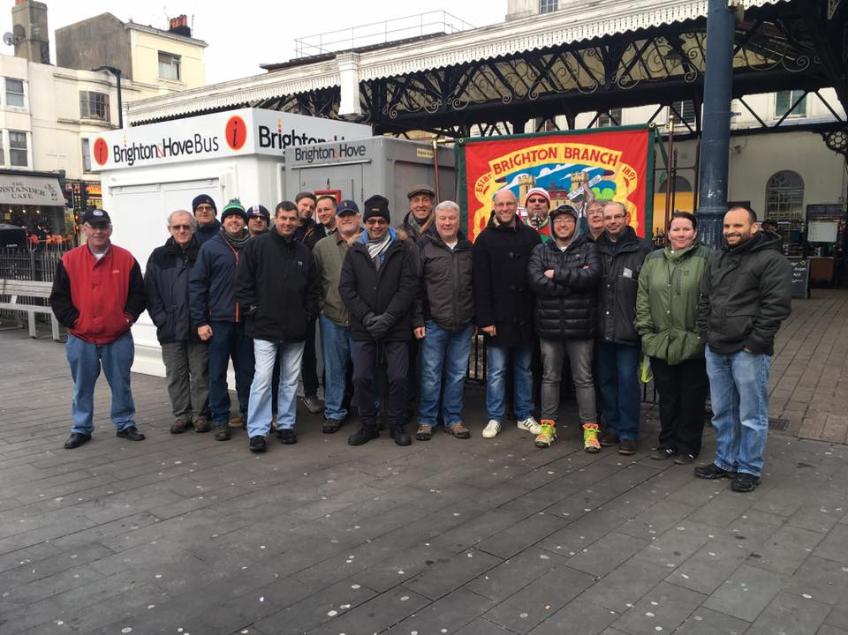
DAVE HUNT COLLECTION
LOCOMOTIVE JOURNAL
OCTOBER 2016
T.U.C. CONFERENCE 2016
Southern, Doo and the DfT it’s all about money and profit
Congress reaffirmed its commitment to public ownership of the rail industry in a wide-
ranging transport debate on Wednesday morning. Simon Weller led the way – followed by the RMT and the TSSA – in a three-pronged attack on the government, the Department for
Transport, and the privatised train operating companies, talking about the failures of Southern Railways, the problems with freight, and how the DfT has come up short.
Speaking from the podium, this is how he introduced himself: ‘Simon Weller, assistant
general secretary of ASLEF, and a train driver for 20 years, 15 of them at Brighton, my home depot and my home town, and I stand in solidarity with my workmates at Brighton and at Southern. Let’s be absolutely clear, this is not a spat over pay, or t&cs, this is about trying to destroy decent jobs. After the McNulty report it was clear they wanted driver only operation, to get rid of the traditional guard’s role, with safety responsibilities. This is all about money and profit and the on board supervisor is not guaranteed to be on the train.‘My daughter is 25 and her generation is scrabbling to find work on zero hours contracts. On Southern we still have proper, decent jobs yet this government is trying to destroy them. The DfT is funding this, and the DfT is taking us on.
Time, comrades, we put our hands in our pockets and assist our brothers and sisters on
Southern.’ Simon also laid into the Conservative government for its failure to help ease – and, over coal, to directly cause – the problems in the freight sector.
‘We are witnessing the slow death of freight on rail, with operators cherry picking the work – fight amongst yourselves to get the most profitable work. The decline of coal and steel traffic is so severe that the very future of the industry is at risk. Freight is the only part of the railway which is fully privatised, and receives no government support, and once capacity declines it cannot quickly be reversed.
‘A sharp decline in rail freight capacity would be disastrous for the future of the British
economy across the supply chain. Rail is vital to a balanced freight sector and essential to the maintenance, health and safety of the entire rail network.
‘We want public ownership of the rail freight industry, to better facilitate sustainable and
long-term growth in the sector, and to secure future rail freight capacity, just as we want
public ownership of the rest of the railway industry. Because firms, as well as passengers, and workers, are suffering from the short-termism of Britain’s privatised railway.’
Three Bridgs Members (Southern) Picket Line
Friday 16th December 2016
DAY 3
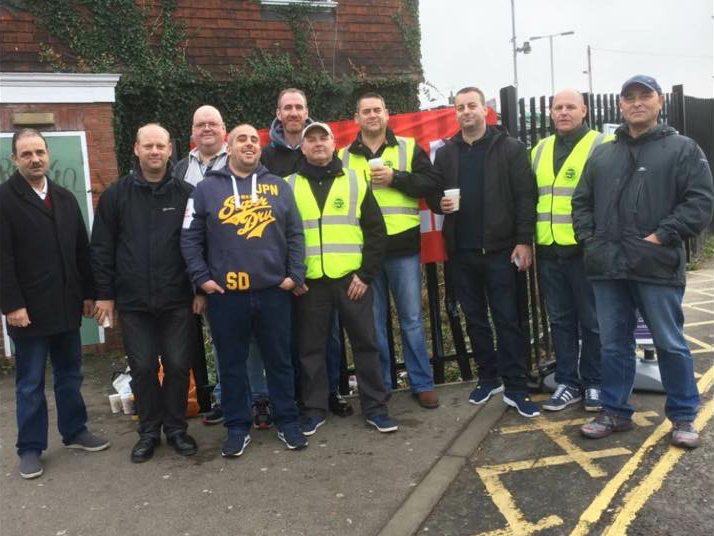
LOCOMOTIVE JOURNAL
NOVEMBER 2016
Ballot for action on Southern
The intransigence of the company – backed, many feel,
by the D.F.T. –has led us to this place
ASLEF is balloting our drivers on southern for industrial action after last-ditch talks at head office on Monday 17 October failed to resolve the problems at the heart of this dispute.‘We have genuinely sought to reach a compromise with southern,’ said General Secretary Mick Whelan. ‘We have always been prepared to talk to the company, and we have always been of the view that it is, or should be, possible to do a deal – as we did with Scot rail – but it takes two to tango and the company has not been prepared to negotiate. They want to impose, not to discuss. They have dug in their heels and forced us to ballot our members.’ our trade dispute with the company is that there should be no introduction and/or extension of new driver-only operated routes on southern without the agreement of A.S.L.E.F.Labour has accused southern of disregarding concerns over safety. shadow Transport secretary Andy McDonald said the long - running dispute about the role of guards – which involves the R.M.T. as well as A.S.L.E.F. – should be settled through negotiation, not by legal action.
‘Nobody wants to see these strikes go ahead, least of all the staff,’ said Andy. ‘But the way to avoid industrial action is for all parties to get back round the table and reach a negotiated settlement, not by launching legal challenges. southern is disregarding concerns over safety on our increasingly overcrowded network and demonstrating an unwillingness to come to a workable agreement.’
Horsham Members Picket Line
Friday 16th December 2016
DAY 3
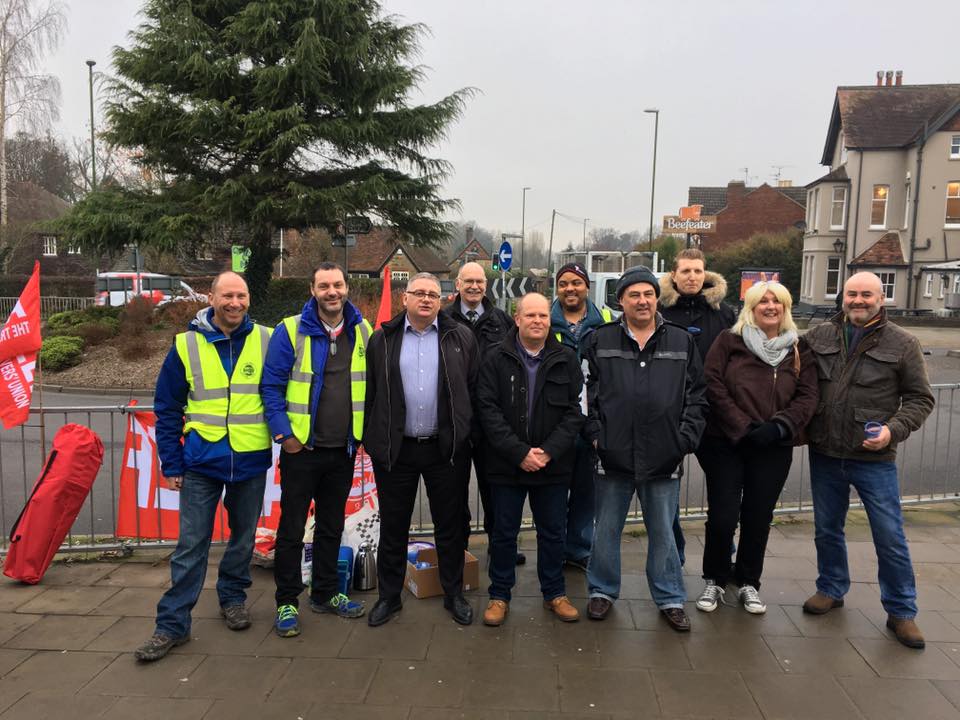
LOCOMOTIVE JOURNAL
NOVEMBER 2016
Conflict of interest
The boss of Southern is also a director of the supposedly independent organisation which
oversees rail safety. A leaked memorandum from the Rail Safety and Standards Board,
published in the Morning Star, reveals that the R.S.S.B. backs Southern’s continuing attempts to remove guards from trains despite the role they have played in helping passengers after accidents.
The documents show that Southern operator Govia Thameslink chief executive Charles
Horton is also a non-executive director of the R.S.S.B., which is funded by the rail companies – and took an active part in discussions about removing guards from trains despite the fears of passengers.
The memo is a research brief giving details of the R.S.S.B.’s views on ‘increased profitability for train companies’ if guards are removed and driver only operation is introduced. The briefing, which lists Horton as a participant in the discussions, says: ‘Adopting a strategy of guards’ redundancies delivers the greatest economic benefit.’
The unions believe the company wants to put private profit before passenger safety.
Barnham Members Picket Line
Friday 16th December 2016
DAY 3
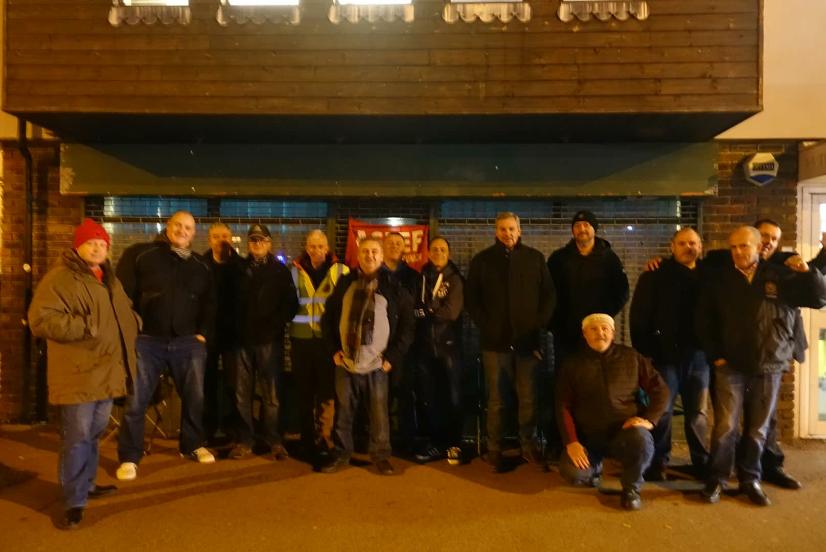
TEL WADEY COLLECTION
LOCOMOTIVE JOURNAL
NOVEMBER 2016
M.P.s tell Southern to ‘get a grip’
The House of commons Transport select committee has urged ministers to ‘get a grip’ on
monitoring rail franchise agreements – citing especially the suffering of southern passengers.
M.P.s said evidence from passengers was dominated by the problems at G.T.R. and
considered whether the company is now in default of its contractual obligations due to the
number of train cancellations. ‘in normal circumstances, this would be grounds for
termination of the contract.’
The D.F.T.’s claim that no other operator could do a better job in the circumstances was no
longer credible, said the committee.
On parts of the national rail network, passengers struggle daily to get the service they
deserve, citing overcrowding, delays, complex ticketing and a lack of access for disabled
passengers.
‘Passengers now contribute more than 70% of the industry’s real income,’ said committee
chair Louise Ellman. ‘But, in too many places, passengers are badly serviced by the train
operating companies.’
The report recommends an automatic compensation scheme be set up to refund southern
passengers directly without the need to make a claim. The D.F.T. said: ‘simply changing the
management or taking the franchise from G.T.R. would not address the issues and would only create uncertainty and cause further disruption.’
Eastbourne Branch Picket Line
Friday 16th December 2016
DAY 3
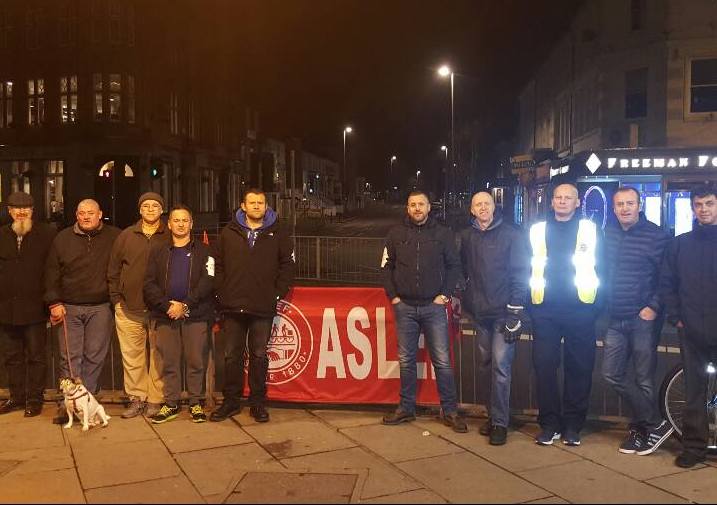
PAUL DONNELLY COLLECTION
LOCOMOTIVE JOURNAL
NOVEMBER 2016
OOPS! RED FACES OVER P.R. DISASTER
Southern had a full scale PR disaster on its hands last month when the company begged
beleaguered passengers to tel the RMT how they feel about the strikes. The plan – which
senior management thought was ‘an absolute hoot!’ – backfired spectacularly.
Southern tweeted: ‘Tweet @RMTunion & tell them how rail strikes make you feel.’ Hundreds of passengers responded, but not in the manner management hoped.
Simon Cox: ‘I dislike unions but I dislike incompetent management more.’
Ferdinand Kingsley: ‘You’re a shambles and this is embarrassing. I hope you lose your
franchise.’ Ursula Doyle: ‘I support the RMT. You, on the other hand, are a disgrace.’
Brighton A.S.L.E.F. Members (Southern) Picket Lines at Brighton Station on Tuesday 10th January 2017DAY 4
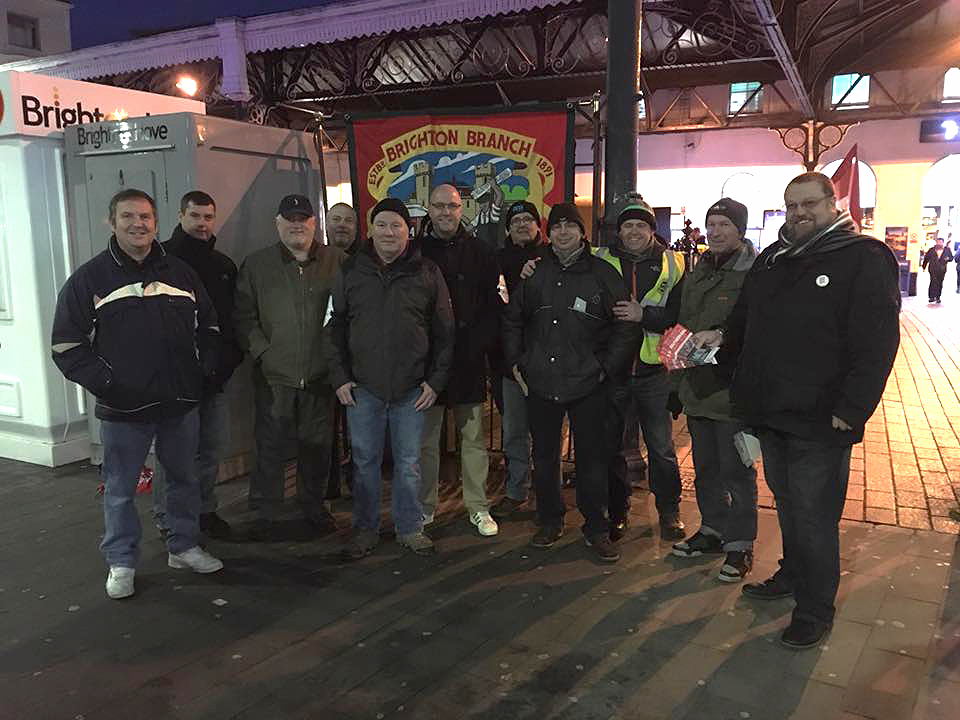
DAVE HUNT COLLECTION
LOCOMOTIVE JOURNAL
NOVEMBER 2016
COVERING UP
PAUL DAVIES, managing director of a management consultancy,
reveals the cosy relationship between Govia Thameslink Railway
and the Department for Transport
Where is undoubtedly a cosy relationship between the Department for Transport and Govia
Thameslink railway but perhaps more worrying are the attempts to cover up this unhealthy
alliance – now orchestrated at the top of the civil service and including the cabinet secretary,
Sir Jeremy Heywood, and the government in the form of the minister for the cabinet office,
Ben Gummer.
We all have an interest in this – because it appears that the government, and the DfT, are
using the relationship with GTR to bully the train company’s staff and, as the service
deteriorates, to blame the unions to cover up an unhealthy relationship between civil servants and a private company.
WEB OF FALSE INFORMATION
I started to unravel this cosy relationship, between Govia and the DfT, over what seemed to
be initially a fairly trivial matter the Independent Penalty Fares Appeals service. Parliament
required that if penalty fares were introduced, there should be an independent appeals service.
But it turns out that I.P.F.A.s is anything but independent – in fact it is run as an integral part
of southeastern Trains – owned, like southern, by govia. To cover this up the DfT and its
Permanent secretary Philip Rutnam created a web of false information including the
statement that I.P.F.A.s was a separate business unit and then ‘an arm’s length subsidiary’.
Even though he knew neither statement was true, Philip Rutnam has refused to respond to
requests to correct them.
Nick Bisson, then Director for rail, eventually admitted that every time a penalty fare appeal
is turned down, executives of govia personally benefit financially – with the blessing of the
DfT. A DfT official also admitted that if an appeal is upheld, govia’s executives still benefit
financially as the DfT has authorised Govia to charge an ‘administration fee’.
This is when i started to smell ‘something rotten in the state of Denmark’. i seemed to be
scratching on the surface of a major scandal – if the DfT were prepared to help Govia’s
executives make money secretly here – what else was going on?
I started to dig deeper and found that David Brown, chief executive of Govia, on a base salary of £2,160,000, used to be head of London surface transport – and a colleague of Philip Rutnam. I saw that the contract to run Thameslink wasn’t actually a franchise – but a
management contract. This meant that Govia could do what it liked but faced no financial risk – it just got paid.
WORST PERFORMING COMPANIES
Charles Horton, who had run southern Trains, and then southeastern, both among the worst
performing train companies for passengers, now runs GTR – which is absolutely the worst
performing company. Peter Wilkinson, who worked with govia to win the GTR contract, is
now employed by the DfT – on a salary of £265,000 – to manage that contract which is,
clearly, a conflict of interest. Wilkinson then set about insulting the staff to exacerbate an
industrial dispute as a way of disguising the appalling service that GTR provide. no one
outside the DfT, and civil service, believes govia should be allowed to run Thameslink – but
Rutnam is determined to protect Govia, and Brown and Horton, at all costs.
I got nowhere with my complaints to the DfT, so I wrote to the chief executive of the civil
service, John Manzoni. He refused to do anything about the falsehoods authorised by
Rutnam, on the grounds that this was government policy on the railways, and that my
complaints had already been dealt with. i began to see that there was an active cover up of the unhealthy relationship between GTR and the DfT, which extends to the very top.
I wrote to sue gray, director general of propriety and ethics in the civil service, who
eventually agreed to investigate if Rutnam had endorsed a falsehood to the cabinet office and the public to cover up the cosy relationship. i twice had to formally complain about her
prevarication – her repeated failures to report back – with no response. she finally wrote back at the end of July rejecting my complaints without mentioning what the complaints were about! Sue Gray, you might not be surprised to learn, has also been at the DfT – and is a former colleague of Philip Rutnam.
I wrote to sir Jeremy Heywood complaining about the cosy relationship between Govia and
the DfT. I received a letter back, on behalf of sir Jeremy and Mr Gummer, which denied that
my complaints had been suppressed. That letter, though, contained no facts. my complaints
were not dealt with, just denied.
INDEPENDENT INQUIRY
What I have uncovered is a cosy relationship and a scandalous cover up which means that
Govia and its executives profit unfairly, that Govia is allowed to run an appalling train service regardless of the misery inflicted on passengers and staff, and that senior civil servants believe they can act and behave appallingly, without public accountability. meanwhile the reputation of our railway is being trashed.
We should all demand an independent inquiry – so we can lay bare the appalling scandal at
the heart of this relationship between Govia and the DfT.
Three Bridges Branch Picket Line
Tuesday 10th January 2017
DAY 4
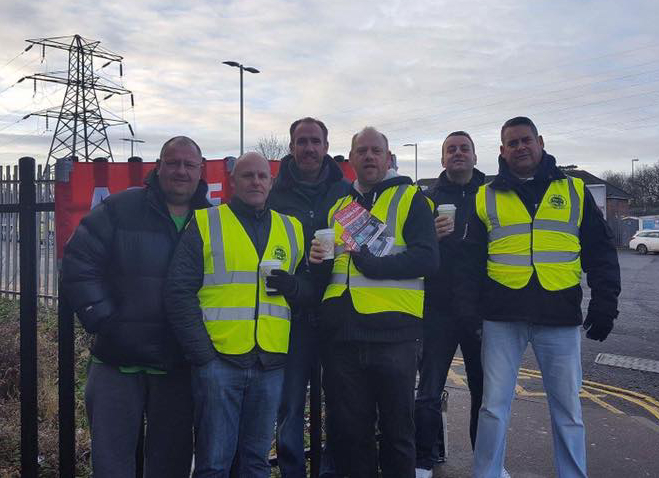
LOCOMOTIVE JOURNAL
DECEMBER 2016
DOO illegal says Dot
The national Pensioners’ convention, Britain’s biggest organisation for senior citizens, says
driver only operation is illegal under the Equality Act. ‘our concern is that if a driver only
train runs to an unstaffed station, with a passenger who is unable to exit the train unassisted,
an offence will be committed under the Equality Act 2010 by putting that person at a
substantial disadvantage,’ said Dot Gibson, general secretary of the N.P.C. ‘This needs to be
understood and acted upon by the office of rail and road, the Department for Transport and
the train operating companies. After 30 years of commitment, effort and public expenditure,
to ensure disabled people can travel by train with confidence, we risk taking a retrograde step that will effectively deny people these hard-won rights and freedoms.’
The Rail Safety Standards Board says Southern’s plan to remove guards from trains will
disadvantage disabled and elderly passengers.
Horsham Branch Picket Line
Tuesday 10th January 2017
DAY 4
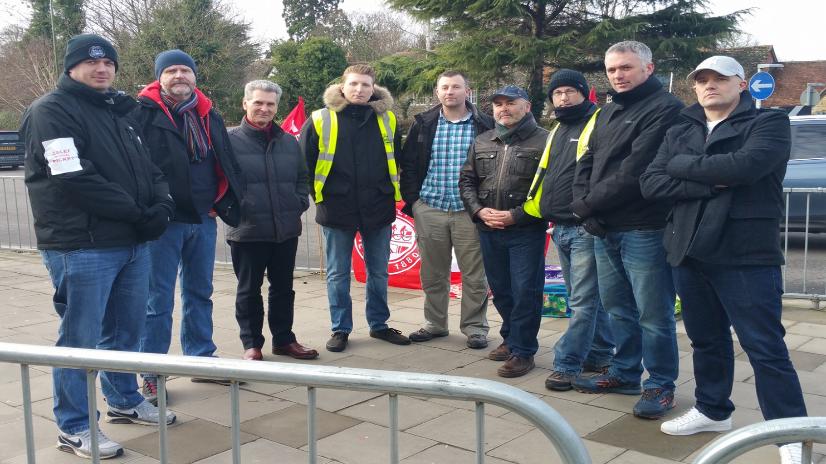
LOCOMOTIVE JOURNAL
DECEMBER 2016
Platform danger on Southern Failways
The Association of British commuters has called on the Department for Transport to step in
and prevent a tragedy on southern rail. ‘We have been inundated with reports of health and
safety risks related to overcrowding on the southern rail network,’ said a spokesperson.
‘Problems we witnessed for many months, and reached their peak during the strike action.
our lawyers have written to the D.F.T. seeking clarity on whether they conducted any risk
analysis in advance of the R.M.T. strikes, and at what point the D.F.T. will consider these
risks sufficiently serious to warrant termination of the franchise.
‘We want to know what instructions, if any, the D.F.T. has given to G.T.R. to minimise the
effect on rail users, and whether G.T.R.’s implementation of these instructions is being
properly monitored. Witness reports include violence at Brighton station, dangerous
overcrowding, mass panic, mass rushes along overcrowded platforms to board trains after
last minute announcements, and a child abandoned on a platform due to overcrowding.
‘The D.F.T. has failed to enforce the G.T.R. franchise agreement and is evading responsibility to provide proper transparency.
We have no confidence in G.T.R.’s management of the network, or the D.F.T.’s oversight; extra overcrowding during the strikes represents an unacceptable H&S risk to the public; it is not a matter of if but when we will see a tragedy on the network.’
Horsham Branch Picket Line
Tuesday 10th January 2017
DAY 4
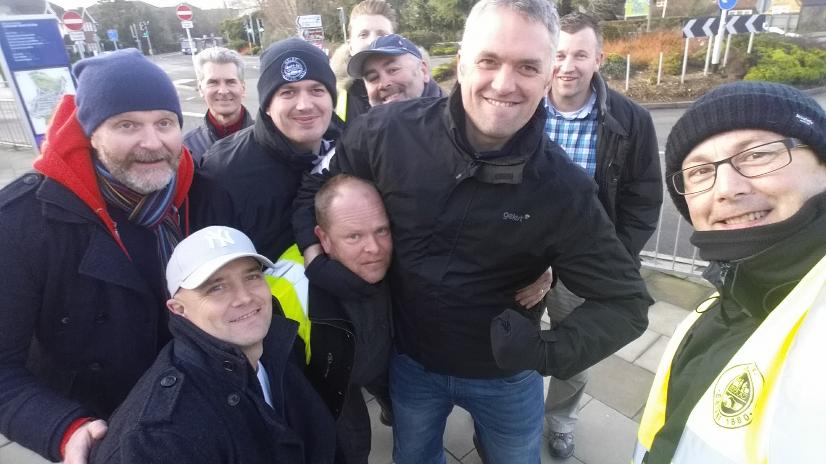
LOCOMOTIVE JOURNAL
DECEMBER 2016
D.O.O. not fit for purpose
Mick Whelan has told M.P.s why A.S.L.E.F. is opposed to the introduction and/or extension of driver only operated routes, why the union is balloting members on southern for industrial
action, and why D.O.O. is inherently unsafe.
‘it’s been our policy for over 15 years to seek to eradicate D.O.O,’ said Mick. ‘D.O.O. was
designed for three-car 317s on the Bed-Pan line in the late ’80s early ’90s. But increased
footfall in our industry means that, unfortunately, when you have 1,100 passengers on 12 cars and you get two seconds to check 24 sets of doors, well, we don’t feel that’s adequate time to deal properly with the safety of the public.’
Mick was giving evidence about the industrial dispute with G.T.R. on southern, and the
failure of franchising, to the House of Commons Transport select committee in the Grimond
room at Portcullis House on 24 October.
‘We were aware [of plans for D.O.O on Southern] and did consult with the D.F.T. but they go through a token exercise and ignore the input. We did warn of the possible outcome of
changing terms and conditions and methods of working through the invitation to tender. But
the company is saying the government has told them to do this; so the people trying to resolve this situation don’t have the power to resolve it.
‘The difference between us, and the D.F.T. and some of the companies we have to deal with, is that we’re honourable. Where we have agreements we seek to change them because we think they’re inherently unsafe. And the industry is now catching up.
D.O.O. is not fit for purpose. There are blind spots all over the place.’
Barnham Branch Picket Line
Tuesday 10th January 2017
DAY 4
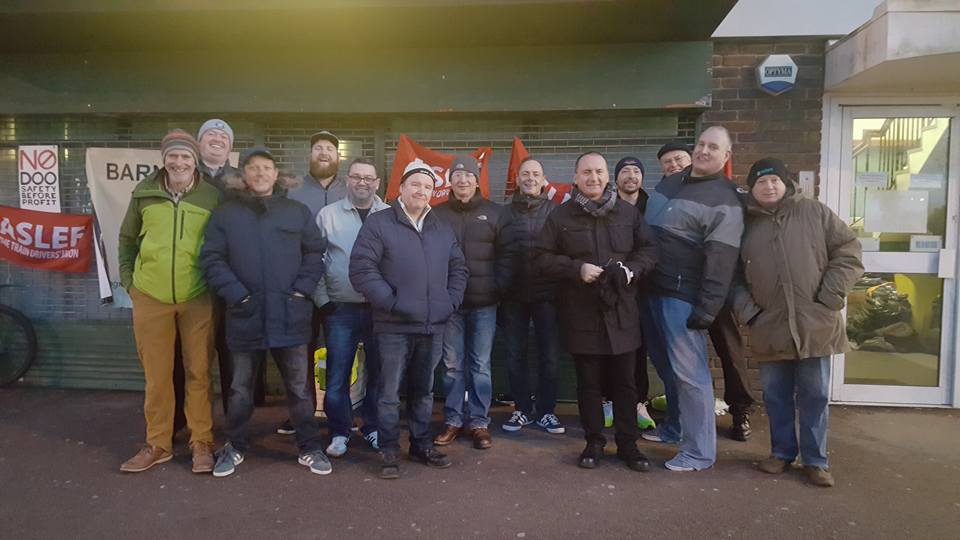
Today I was proud to stand on the first A.S.L.E.F. picket line to be seen at Brighton for nearly 17 years.Over the course of 3 shifts covering 12 hours, nearly 30% of our establishment showed their
support for this lawful industrial action.
Given that a third of our drivers were rest day and had probably made prior arrangements, and
taking into account the distances some people would have to travel, this was in my opinion a
good turnout.
We will doubtless have many colleagues for whom industrial action is a new, and possibly
daunting event, but hopefully these photos will serve to allay there fears concerning striking and encourage them to join their friends on the line.
The support of our Guard colleagues with us on the line was a great encouragement.
support for this lawful industrial action.
taking into account the distances some people would have to travel, this was in my opinion a
good turnout.
daunting event, but hopefully these photos will serve to allay there fears concerning striking and encourage them to join their friends on the line.
Tony Brace
Brighton L.D.C.
13.12.2016
Barnham Branch Picket Line Tuesday 10th January 2017DAY 4
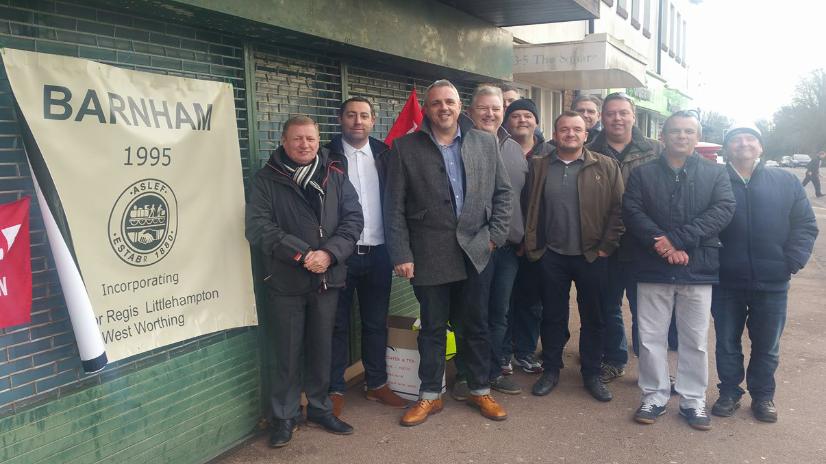
LOCOMOTIVE JOURNAL
JANUARY 2017
In the eye of the storm
The say it’s peaceful at the eye of the storm but, let me assure you, it’s not. You quickly learn that the media, the government, and some of the public don’t care about the real issues. The media, with one or two interesting exclusions, pander to the rhetoric about nasty unions
hurting working people. I am yet to hear many people defend us for standing up not for gain,
but for safety, on GTR Southern. And where is the public outcry for 1,116 freight train drivers facing uncertainty at DBC after years of loyal service?
The government has chosen not to intervene or investigate the issues that may put the
viability of our infrastructure at risk and I do not hear a lot from the appropriate industry
quangos. As for GTR Southern, having employed them to do their dirty work, and caused all
the issues that face us, the government attacks our right to strike; something we never do
lightly or without family, and personal, cost. They’re getting desperate when they claim we
are seeking to bring down the Tories; we are simply reacting to issues not of our making.
Apparently we have a pact with sister trade unions; we do not, we have a joint campaign
and are not even both affiliated to the same political party and, of course, compete with them
in several areas.
We understand that passengers, paying inflated fares for a service that was crap before any
action was taken, are naturally upset.
Evidence of full crews sitting around while trains are cancelled makes you wonder what the
company is up to. But we are receiving far more messages of support and 73% of the public
want a guard on every train.
I am never surprised at the solidarity and unity you are showing at this difficult time. The
constant drip feed of lies that we are refusing meetings, or of offers being made, and of course taking us to court, is all designed to undermine that. Offers to meet if we suspend or cancel action are not genuine; going to ACAS to be told ‘let us complete what we are doing and then we can talk about how we normalise relationships’ is not an offer, and you would rightly castigate us if we pursued either of those avenues.
This is not about DOO, but dwell times, and is a scenario likely to be repeated in other
franchises in coming years.
Despite our challenges, may I take this opportunity to wish you a Happy and Peaceful New
Year.
Yours fraternally
Mick Whelan
General Secretary
Eastbourne Branch Picket Line Tuesday 10th January 2017DAY 4
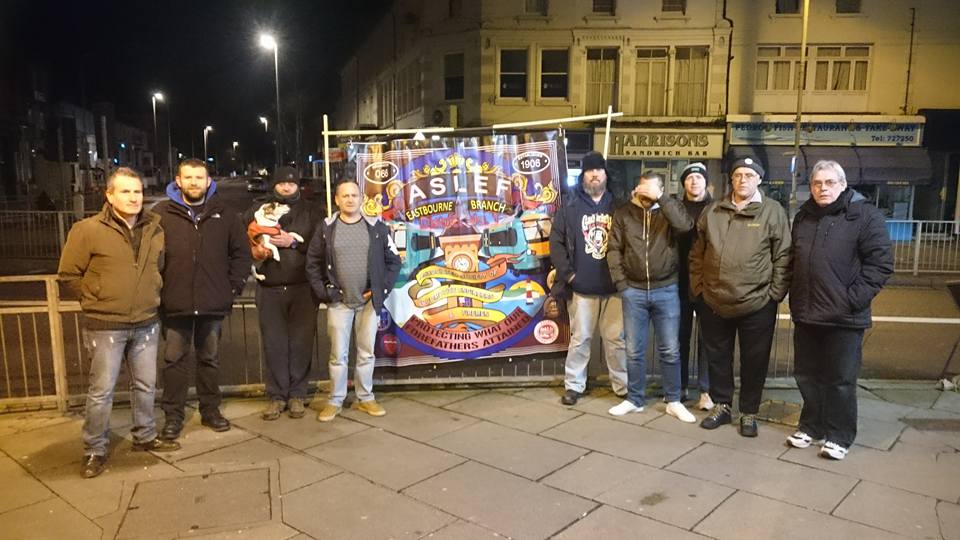
Harry McCormick Collection
LOCOMOTIVE JOURNAL
JANUARY 2017
Standstill on Southern when drivers walk out
A.S.L.E.F. members on Southern Railways went on strike on Tuesday 13,Wednesday 14 and
Friday 16 December in a dispute over the company’s decision to try and force through driver
only operation on the franchise. Drivers, who voted overwhelmingly for action – 87.3% to
strike, and 95.6% for industrial action short of a strike, on a turnout of 77%, well above the
government’s artificially high new threshold – will walk out again from Monday 9 to Saturday 14 January. Train drivers have not been doing overtime since Tuesday 6 December.
The strikes closed the Southern network – not one train moved – and, as the T.O.C. refuses to employ enough drivers to fulfil its legal franchise commitments, the overtime ban has hit the company hard, too, forcing it to cancel dozens of services every day.
‘A strike is always the last resort but, faced with an intransigent management, our only
option,’ said general secretary Mick Whelan. ‘We tried to reach a sensible, workable
compromise with Southern in the interests of passengers, the company, and staff. We always
believed it should be possible to do a deal – as we did with ScotRail – but it takes two to
tango and the company has not been prepared to properly negotiate.’
The company – with a desperately thin argument about E.U. laws on freedom of movement
and the right of people to get to Gatwick Airport, described by the judge, Sir Michael Burton, as ‘novel’, a legal euphemism for ‘risible’ – took the case to the High Court, where it lost, and then to the Appeal Court, where Lord Justice Elias, sitting with Lord Justice Lewison and Lord Justice Lloyd Jones, backed our right to take lawful industrial action.
A.S.L.E.F. officers were out in force explaining our action. The G.S. was interviewed by John Humphrys in the prestigious 8.10 a.m. slot on Today on Radio 4; by Jo Coburn on Daily Politics on B.B.C. 2; by ITV News, Sky News and Channel 5 News. A.G.S. Simon Weller appeared live with Steph McGovern just after 8 a.m. on B.B.C. Breakfast; with Michael Crick on Channel 4 News; and with Jeremy Vine on Radio 2. D.O. No.1 Graham Morris was on B.B.C. South-East and Radio 5 Live and E.C. No.1 Marz Colombini did B.B.C. London and a phone-in on 5 Live, too.Mick said: ‘Our critics, in the government, and in the media, do not understand that unions, especially this one, are membership-driven and that we articulate the voice and the concerns of all the train drivers in the U.K. Bearing in mind that up to 80% of U.K. rail is now wholly or partially run by operators in other countries the court case, calling into question the right of British workers to strike, was perverse. Fortunately, the court saw sense.’
Brighton A.S.L.E.F. Members (Southern) Picket Lines at Brighton Station on Wednesday 11th January 2017DAY 5
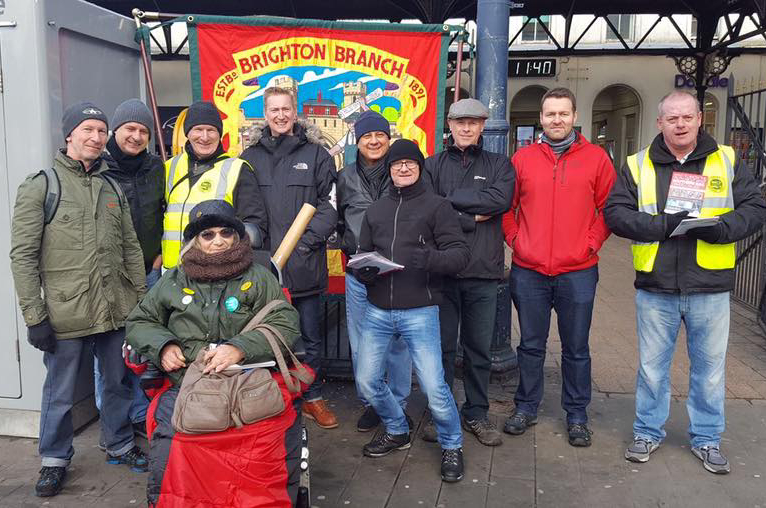
BOB KETTLE COLLECTION
Three Bridges Branch Picket Line
Wednesday 11th January 2017
DAY 5
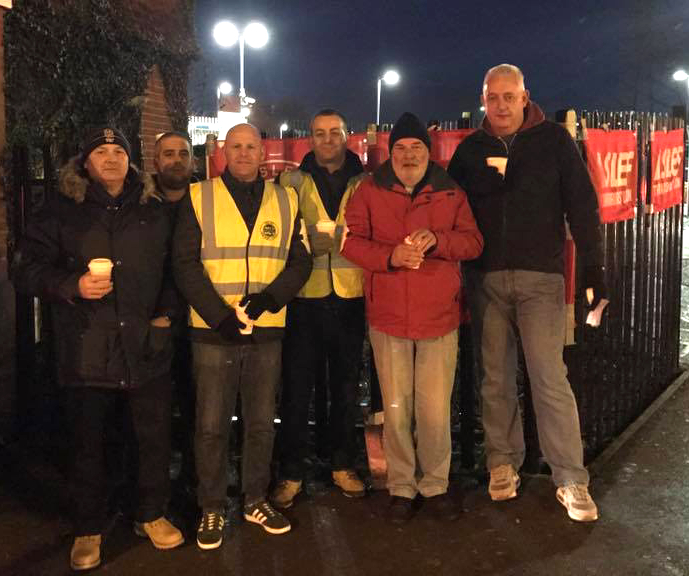
IAN HUNT COLLECTION
LOCOMOTIVE JOURNAL
JANUARY 2017
Sign o’ The Times
MICK WHELAN spoke out in response to a letter published in The Times on 21 November
which was picked up as a news story and for a leading article in the paper. The tendentious
contribution, from Paul Plummer, chief executive of the Rail Delivery Group, was co-signed by Martin Griffiths of Stagecoach; Mark Carne of Network Rail; Karen Boswell of Hitachi;
David Higgins of HS2; Russell Mears of Freightliner; David Begg ofTransport Times and ‘a
further 20 names’ according to the paper in a clumsy but co-ordinated campaign to push
DOO.
‘It’s a shame that Paul Plummer doesn’t know what he’s talking about,’ said Mick. ‘What Mr Plummer – who, with his background in accounting, has no operational experience of
Britain’s railways – mendaciously refers to as ‘modern technology’ is in fact nothing of the
sort; it is technology designed in the 1970s, and introduced in the 1980s, which is palpably
unfit for the number of passengers we have in the 21st century.
‘What Mr Plummer disingenuously refers to as “smarter working” is, in fact, a desire to cut
corners, and cut costs, and bring in zero hours contracts, in order to drive up profits for the
privatised train operating companies that he represents.
‘As the trade union which represents Britain’s train drivers, we, too, believe in investment in
the railways; but investment in what should be a public service, run properly and efficiently
for passengers, businesses and taxpayers, not for the TOCs which, as we see every day on
Southern Railways, are manifestly failing passengers as well as staff. We would be willing to debate this publicly with Mr Plummer, any time, any place.’
We sent a letter refuting all of Paul Plummer’s allegations but The Times, which
acknowledged receipt of our response, chose not to publish it.
Horsham Branch Picket Line
Wednesday 11th January 2017
DAY 5
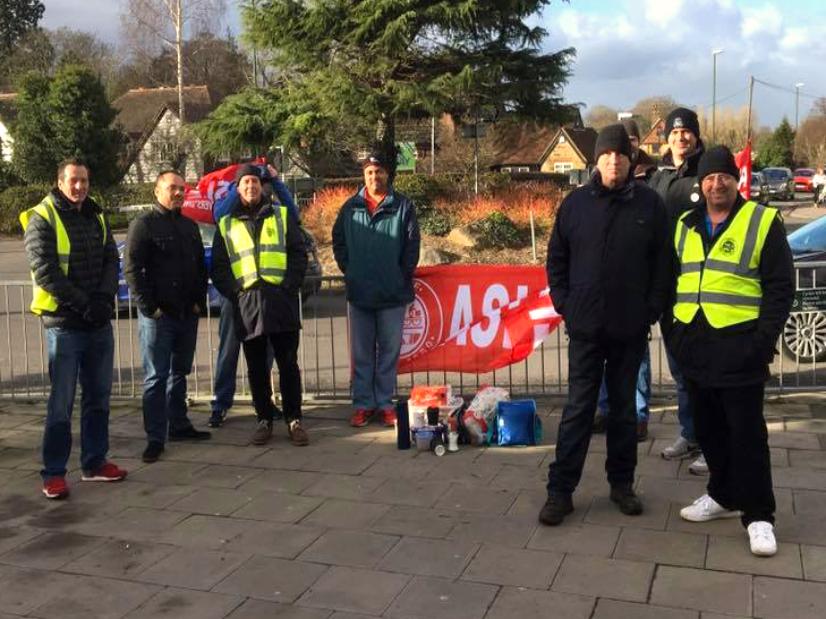
LOCOMOTIVE JOURNAL
JANUARY 2017
DfT ‘in bed with GTR’
Paul Davies, who wrote about the relationship between GTR and the DfT in the Journal (November), has launched a campaign on the 38 Degrees website for an inquiry into the conduct of Philip Rutnam, permanent secretary at the Department for Transport. ‘I’ve
launched a petition I hope you will sign – and let’s hope we get 100,000 signatures because
that will trigger a Parliamentary debate. Rutnam authorised falsehoods to the Cabinet Office
to protect the cosy relationship with Govia, subjecting the travelling public to unacceptable
conditions on Southern. It’s a management contract which means Govia takes no financial
risk, the public pays compensation if GTR fails, and it fails daily, and Govia’s understaffing
results in higher profits. Rutnam has presided over the East Coast franchise debacle, the West Coast re-franchising debacle, the failure of Western electrification to deliver on time or on budget, and the catastrophe at GTR-Southern.’
Horsham Branch Picket Line Wednesday 11th January 2017DAY 5
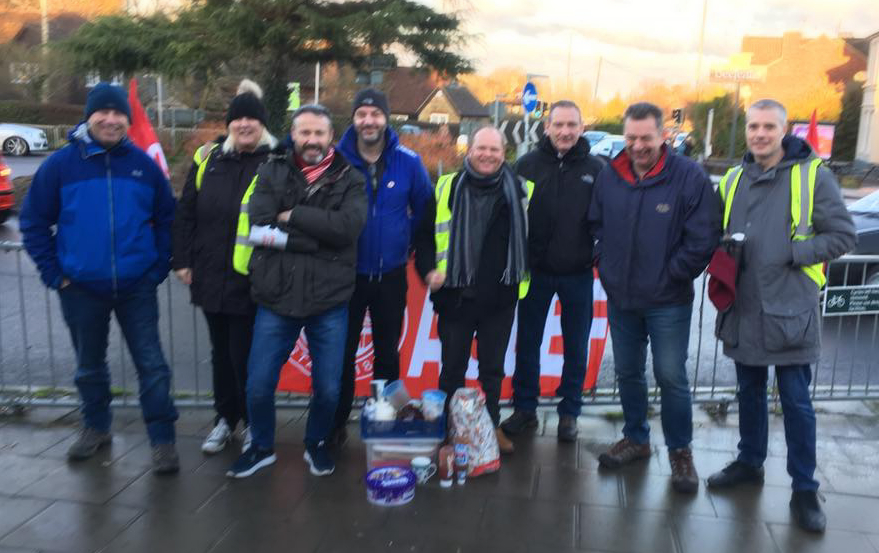
LOCOMOTIVE JOURNAL
FEBRUARY 2017
Wilkinson and DfT in conflict of interest row
PETER WILKINSON, the controversial civil servant who is paid £265,000 a year –
considerably more than the Prime Minister – as director of rail passenger services at the
Department for Transport, has been exposed by an investigation in The Guardian for an
apparent conflict of interest.
Under the damning headline Civil Servant Gave Southern Rail To Client Of His Firm, Lucas
Amin and Rob Evans revealed how Wilkinson, who ‘awarded struggling Southern Rail its
franchise, made the decision to award the contract while owning a large share in a
consultancy firm that had been advising its parent company.’Wilkinson played a key role in
handing the Southern, Thameslink and Great Northern franchises on a plate to GTR in 2014.
But he was, at the time, a director and the main shareholder of First Class Partnerships, a
consultancy which had Govia as a longstanding client. Wilkinson was also involved in
awarding a 15 year franchise – the Essex Thameside service – to C-2-C which, The Guardian revealed, had also paid handsomely for the services of First Class Partnerships.
According to The Guardian, an internal inquiry by D.f.T. officials concluded that Wilkinson
had a ‘clear conflict of interest’. Wilkinson refused to comment.
Barnham Branch Picket Line
Wednesday 11th January 2017
DAY 5
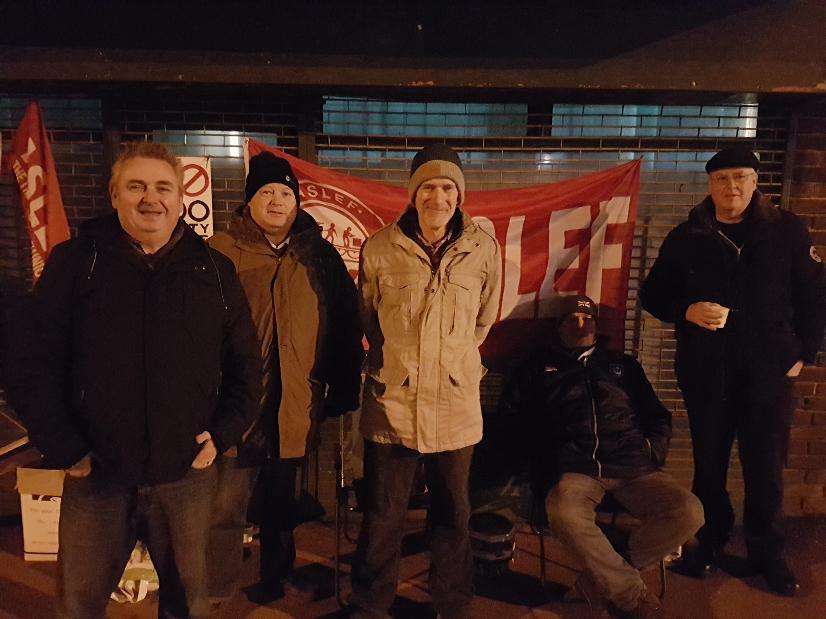
LOCOMOTIVE JOURNAL
FEBRUARY 2017
The last bastion of truth and integrity
HAVE never understood the politics of envy but always supported the ethos of aspiration,
fairness, dignity and respect. As an organisation we have never subscribed to Margaret
Thatcher’s claim that we are a society of individuals but have campaigned on all the issues
that impact on us and our families, from the NHS to social care to dignity in retirement,
education, and investment. This, of course, after we have undertaken the union’s primary role over terms and conditions, wages and safety.
The 136 year history of this craft trade union is one we are rightly proud of, but I’m not sure
those who are not in a union understand.
Polling and research shows people want a well-invested, safe and affordable green integrated railway that works for the travelling public, the taxpayer, the freight sector and those who work in it. Strange, then, when we raise issues affecting the freight sector and the future maintenance of our infrastructure, there is no government support and those stakeholders we speak to are incredibly reluctant to say publicly that they share our concerns. Well, we won’t shut up in the light of hundreds of job cuts and the government’s trite response that ‘the market will assert itself will come back and haunt them as confidence seeps from the sector.
Even odder, given the many messages of support we have received, is the media frenzy over
the dispute on GTR/Southern.
Where is the concern over a dishonourable employer ripping up agreements and dragging us
to court? Where the concern over Peter Wilkinson’s claims in Croydon that he would orchestrate this dispute? We hear nothing from ministers about that. Nine months of court action and we eventually go on strike, and highlight the company’s reliance on our goodwill and overtime to run its service, and the whole world wants to end the right to strike!
Desperate Tory MPs claim the strife their policies caused is political – the last refuge of the inept – while a baying media calls us anti-worker.
Trade unions are the last bastion of truth and industrial integrity in the UK. We fight to make
the lives of our members, and their families, better. We will never apologise for that but we
do empathise with those impacted by our action. And, every day, the solidarity and unity you show inspires me.
Yours fraternally
Mick Whelan
General Secretary
Barnham Branch Picket Line Wednesday 11th January 2017DAY 5
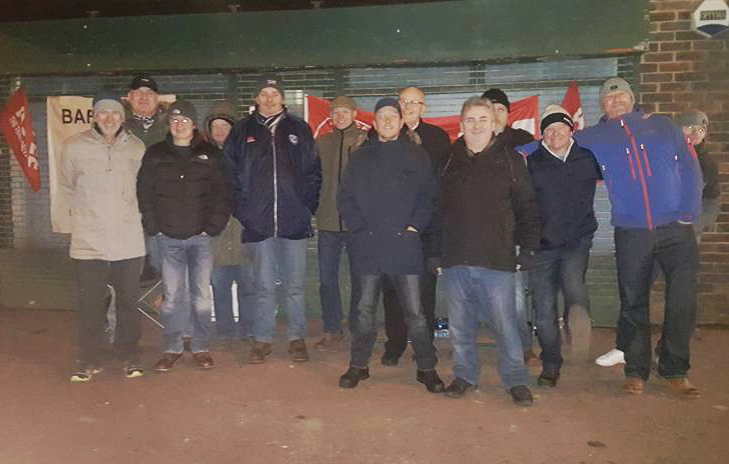
LOCOMOTIVE JOURNAL
FEBRUARY 2017
Passengers blame Southern as train drivers strike again
A.S.L.E.F. drivers on Southern Railways went on strike on Tuesday 10th, Wednesday 11th and Friday 13th January in the continuing dispute over the company’s controversial decision – which rail industry experts say has backfired badly – to try and force through driver only
operation across the region. Members, who voted overwhelmingly for action – 87.3% to
strike, and 95.6% for industrial action short of a strike, on a turnout of 77% – have also not
been working overtime since Tuesday 6th December.
The strikes closed the Southern network – the company was forced to plead with passengers
not to travel – and an attempt to bus some commuters to stations on adjacent franchises,
Southeastern and South West Trains, was also a flop, with rows of empty coaches parked up
at stations.
Passengers explained on social media: ‘Why do I want to add another three- quarters of an
hour to my journey each way? I want Southern to run the service it promised to provide. I
want a guard on every train. It’s time the company sat down with the unions and did a deal.’
General Secretary Mick Whelan said: ‘We greatly regret the industrial action we have been
forced to take. We don’t want to inconvenience passengers, nor do our members want to lose
money, but we have been bullied by an intransigent management which has not been
prepared to negotiate with us.’
District Organiser No. 1 Graham Morris said: ‘There is mass support among drivers for the
strike, and morale is holding up well. The vast majority of passengers are still on side, too,
because they want a second safety- critical role on the train they are taking.’
Brighton A.S.L.E.F. Members (Southern) Picket Lines at Brighton Station on Friday 13th January 2017DAY 6
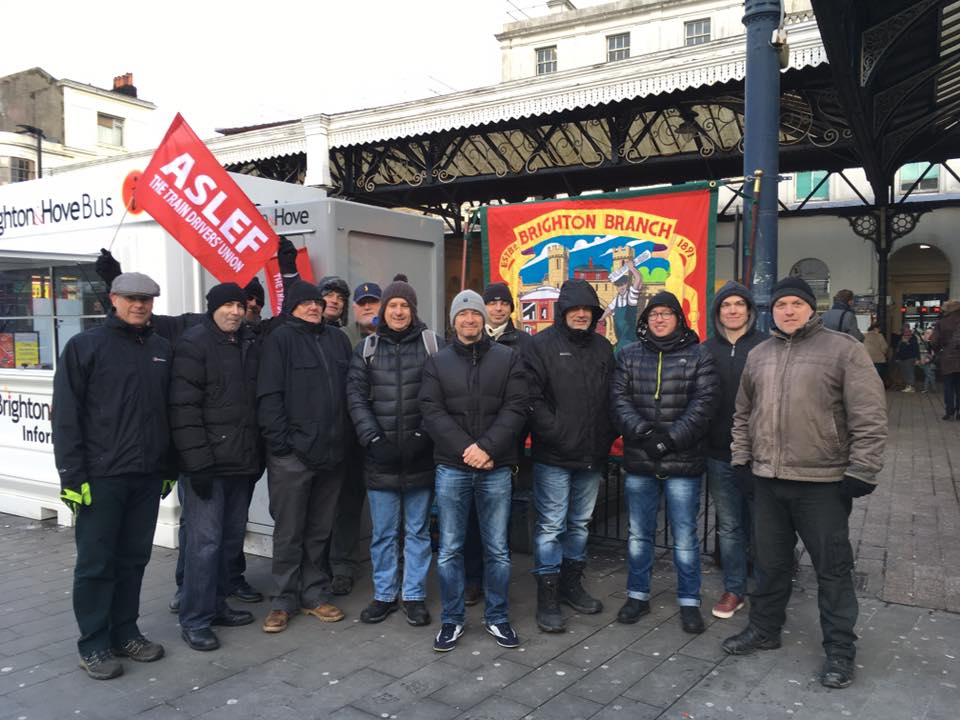
DAVE HUNT COLLECTION
LOCOMOTIVE JOURNAL
FEBRUARY 2017
COLD, WET AND WINDY
Executive Committee Member No.1 MARZ COLOMBINI
REPORTS FROM THE PICKET LINE:
It’s very early, it’s very cold, it’s very windy and there’s not an oil drum fire in sight. Contrary to what the mainstream media would have you believe, standing on a picket line is no fun and not where we want to be. It is a place to which we have been pushed. Six days of strikes and I’ve managed to visit picket lines at Selhurst, Norwood, London Bridge, Three Bridges, Horsham, Eastbourne, Brighton and Barnham. From these visits several things have become clear: our members are disgusted with Southern’s disregard for our safety concerns and outraged by the company’s approach to industrial relations, but, above all, they are solid.
Whether in the capital, on the south coast or anywhere in between, spirits on the picket lines
are high and our members are solidly behind the industrial action and solidly behind
A.S.L.E.F.
On behalf of the executive committee I want to say thank you all for your strength, resolve
and loyalty. Thanks also to our members who made the journeys from the Isle of Wight,
Salisbury and Sheffield to show solidarity with our pickets. Your support is greatly
appreciated.
Three Bridges Branch Picket Line Friday 13th January 2017DAY 6
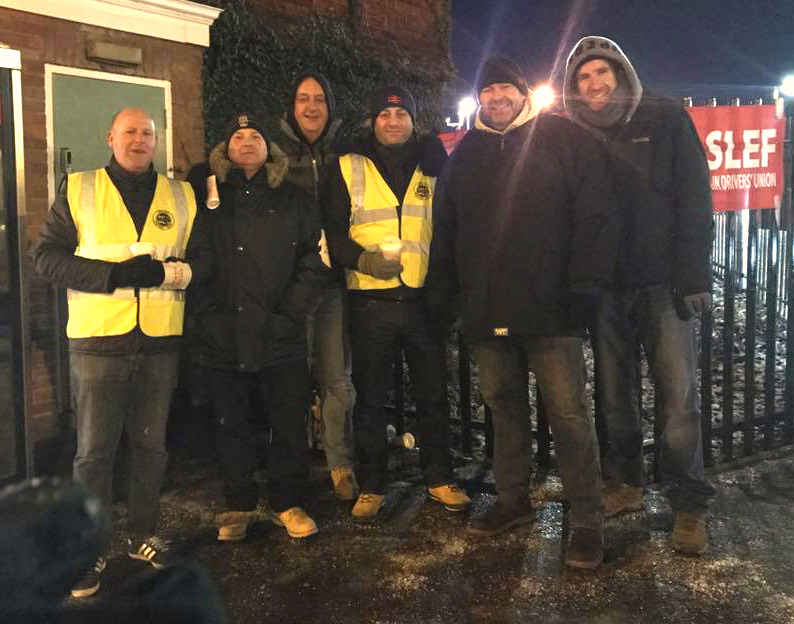
IAN HUNT COLLECTION
LOCOMOTIVE JOURNAL
FEBRUARY 2017
WHAT A WASTE OF MONEY
Mick Whelan has responded to news that G.T.R./Southern, after losing in the High Court, and in the Court of Appeal, is seeking leave to take its case to the Supreme Court. He said: ‘What a waste of time and money! The High Court, and the Appeal Court, have already ruled that our industrial action on Southern Railways is entirely lawful. Instead of dragging this out, and wasting everybody’s time and money, the company should be sitting down with us and trying to resolve the issue.’
Three Bridges Branch Picket Line Friday 13th January 2017DAY 6
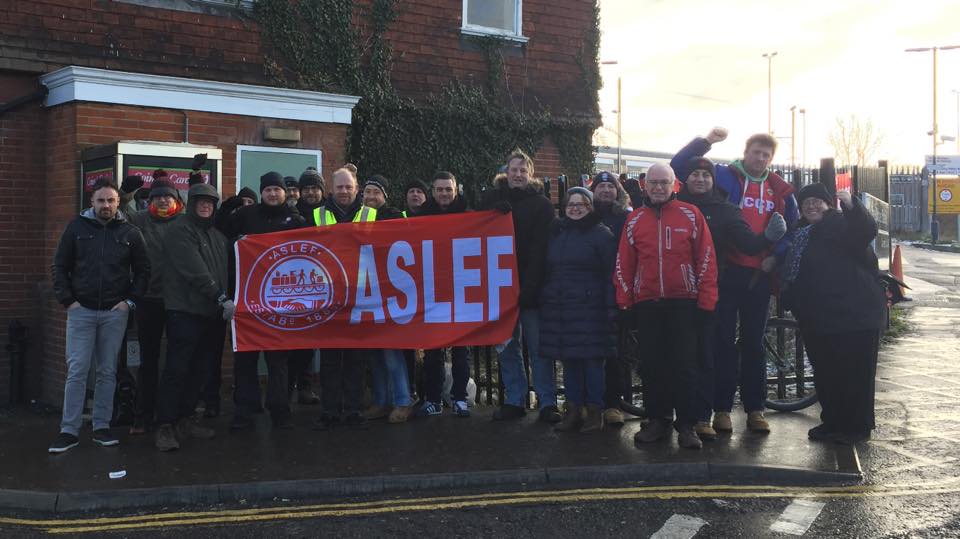
PAUL EDEN COLLECTION
Three Bridges day 6 picket line, solidarity to all including local Labour councillors and members, along with fellow ASLEF members from Portsmouth, Sheffield, Isle of Wight and St Pancras branches.
LOCOMOTIVE JOURNAL
FEBRUARY 2017
The good the bad and the ugly
GS Mick Whelan reflected last month on how it felt to be caught in the eye of a political,
industrial and media storm. Now Keith Richmond looks at how A.S.L.E.F., and our industrial action on Southern, have been covered in print, on television, on radio and online.
The strike, and overtime ban, on Southern Railways is an industrial, not a political, dispute –
whatever it suits Transport Secretary Chris Grayling, Rail Minister Paul Maynard, and a
clutch of under briefed backbench Tory MPs to claim. It is unusual because it is not a battle
for more pay, better Terms &Conditions, or a shorter working week, but a row over
passenger safety.
Not that you would realise this from some of the lazy, dishonest – and sometimes downright
malicious coverage that A.S.L.E.F., and this dispute, has had. The Sun, Daily Mail and Daily Telegraph were, predictably, the worst.
THE BAD
Mario Ledwith in the Mail tried to make our industrial dispute political with a story about
Labour Party leader Jeremy Corbyn and EC president Tosh McDonald – Corbyn Led
Standing Ovation For Strike ‘Comrade’ (2nd January) – while Lucy Osborne – who
cheerfully admitted ‘the editor doesn’t like strikes, strikers or trade unions’ – wrote
‘A.S.L.E.F. has banned its members from doing overtime’ (5th January) even though it was
explained to her that members had voted overwhelmingly for an overtime ban. She also
deliberately got the general secretary’s salary wrong (7th January) by including pension
provision and NI contributions despite being provided with the correct figure.
Patrick Foster, swallowing an inaccurate briefing by the D.f.T., went big on Union Leader
Warns Of 10 Years Of Unrest in the Daily Telegraph (13th December) while Robert Mendick, chief reporter of the Sunday Telegraph, took Mick to task for Disingenuous Claims Of Firebrand Union Boss
Behind Rail Strikes (8th January) although he did concede, after attacking what the R.M.T.
said about an O.R.R. report into D.O.O., ‘A.S.L.E.F.’s response was rather more slick’.
The Sun (22nd December) tried to make something of nothing with Unionists’ 2 Days Off
Rails while the Evening Standard splashed with Rail Strike Boss Off To Work By Car (6th
January) – a risible story which prompted Mark Ellis of the Daily Mirror to laugh ‘Man has
lift with wife shock!’ – and went with Strike Bosses Accused of Being Dictators (12th
January) above quotes from Tom Tugendhat, Tory MP for Tonbridge & Malling.
The cartoonists had a field day too, with Mac in the Mail (15th December) and Adams in the
Telegraph (19th December) imagining Jeremy, Tosh and Santa at Christmas.
THE GOOD
Conrad Landin interviewed District Organiser No.1 Graham Morris for a piece which
appeared in the Morning Star under the headline We Are Determined To Win - Passenger
Safety Too Important To Risk, and The News Line, the paper of the Workers’ Revolutionary
Party, splashed on Southern Are Bullies! (both on 11 January) after talking to Graham on a
picket line atLondon Bridge. Driver Only Safety Claim Blown Apart By Accident by Morning Star news editor Will Stone (12th January) with a picture of an incident on an F.G.W. service at Hayes & Harlington underlined our point that the traction interlocking system doesn’t always work.
Mick was interviewed by Simon Hattenstone for a flattering flagship profile in The Guardian (14th January) and Tosh talked to Danny Scott for a fascinating Life in the Day feature in the Sunday Times Magazine (15th January). And Gwyn Topham wrote a typically thoughtful, and well-informed, analysis on the problems in the rail industry – Is Britain’s Train System Getting Worse? – in The Guardian (7th January).
Our officers have been working hard to get our message across. Mick was interviewed by
John Humphrys on Today on Radio 4; by Richard Westcott for B.B.C. News; and by I.T.V.
News; Sky News; C4 News; C5 News; by Sally Taylor on B.B.C. South Today; by Eddie Mair on P.M. on Radio 4; by Nick Ferrari on L.B.C.; and on Daily Politics on B.B.C.2.
AGS Simon Weller talked to Vanessa Feltz on B.B.C. Radio London; became a frequent guest on the breakfast and drive time shows on B.B.C. Sussex and B.B.C. Surrey; appeared on B.B.C. Breakfast with Steph McGovern; talked to Jeremy Vine on Radio 2; and Michael Crick on C4. Graham Morris was interviewed by Radio 5 Live and Helen Catt, political editor of B.B.C. South-East, while E.C. No.1 Marz Colombini talked to B.B.C. London and went live, at length, on 5 Live.
AND THE UGLY
B.B.C. South-East disingenuously claimed that A.S.L.E.F. was invited to take part in a debate on the dispute recorded on Sunday 8 January and broadcast on B.B.C.1, in the south-east, the next day. We weren’t. Michael Gravesande, the executive producer, invited Charles Horton of Southern; Huw Merriman, Tory MP for Bexhill & Battle; Caroline Pidgeon, Lib Dem member of the London Assembly; and Mick Lynch of the R.M.T. to be on a four-person panel. We were offered a chance to sit in the audience.
Lauren Worrall, the assistant producer, promised we could sit in the front row and added: ‘I
guarantee you will get to ask a question.’
It is, of course, the corporation’s call who it invites to be on its panel though – given that
A.S.L.E.F. was the union on strike – it was a perverse editorial judgement. Quentin Smith,
editor of BBC South-East Today, subsequently rang to apologise but continued to maintain
the fiction that an opportunity to sit in the audience was ‘an invitation to participate in our
debate’.
We live in a free society, with a free press, which has had, for 300 years, the right to be
partial, and the right to be wrong. But in a post-truth world where the alt- right embraces
fake news, it was sad to see Auntie, in the south- east, turn its back on Lord Reith and sell the licence payers short.
Horsham Branch Picket Line
Friday 13th January 2017
DAY 6
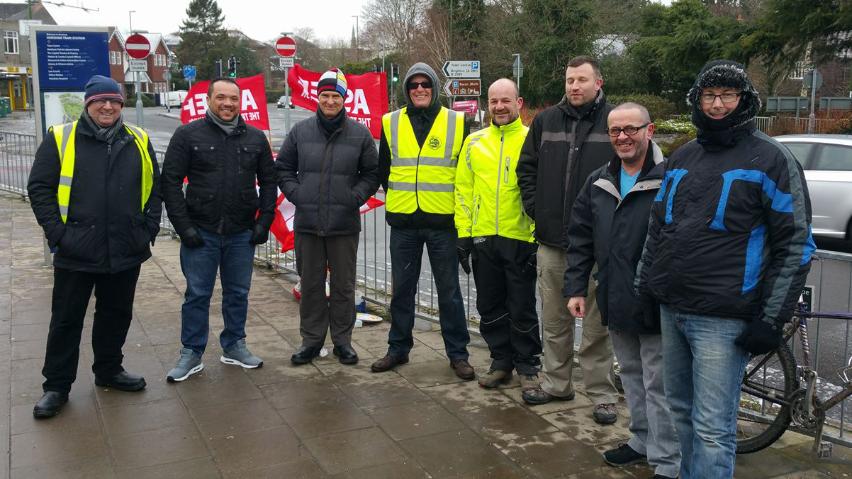
LOCOMOTIVE JOURNAL
FEBRUARY 2017
Anatomy of a strike
A.S.L.E.F. drivers on Southern Railways began taking industrial action in December.
But the antecedents of this strike go back almost a year.
Keith Richmond examines the background to a bitter industrial dispute with no end in sight
Last month as at the end of last year, Southern Railways ground to a halt. That is what
happens when train drivers walk out.
No driver, no train. A.S.L.E.F represents 96% of the train drivers in England, Scotland and
Wales and members don’t cross picket lines. So when drivers go on strike – as on Tuesday
13th, Wednesday 14th and Friday 16th December and then again on Tuesday 10th,
Wednesday 11th and Friday 13th January – the train company is unable to provide the
service it promised to deliver in its franchise application. Also, drivers have not been working overtime since Tuesday 6 December and, as Southern refuses to employ the number of drivers it knows it needs, it has been cancelling one in four services on non-strike days, too.
Hundreds of thousands of passengers have been left frustrated and, on occasion, bewildered.
Most blame the hapless senior management at what commuters call Southern Failways; some blame Chris Grayling, and his predecessor at the Department for Transport, Patrick
McLoughlin; very few blame the drivers, or their union, because they know this is not a strike for more money, a shorter working week, or better terms and conditions, but is action for the safety of the rail network. And the vast majority of passengers – 73% in a survey carried out by Opinium in May last year – want a guard on every train.
TRAIN DRIVERS ARE MUPPETS
This dispute began, effectively, one year ago, though officials at the D.f.T. and managers at
G.T.R. had been planning it for some months before that. On 18 February 2016 Peter
Wilkinson, a controversial figure who earns £265,000 a year as director of rail passenger
services at the D.f.T., got up at a public meeting in Croydon, south London, hosted by
Conservative MP Gavin Barwell, and said he was looking forward to ‘punch ups’ with trade
unions over his plans to force through changes to rosters.
He said: ‘I’m furious and it has got to change – we have got to break them. They have all
borrowed money to buy cars and got credit cards. They can’t afford to spend too long on
strike and I will push them into that place. They will have to decide if they want to give a
good service or get the hell out of my industry.’ Croydon councillor Jeet Bains tweeted:
‘PeterWilkinson absolutely hammering train drivers. Called them muppets.’ Wilkinson’s
comments were so bizarre that Sameena Rizwi was forced to deny claims that her boss was
drunk when he got up to speak.
As well as his inflammatory language, Wilkinson told a string of porkies – claiming drivers
earn £60,000 a year basic and have the same ‘fire break’ rest stops as when trains were run
on coal – but he had, deliberately or inadvertently, revealed what he, the DfT, and GTR
intended to do.
We wrote to Patrick McLoughlin seeking clarification of Wilkinson’s comments and asked if they reflected government policy. McLoughlin – who, like his Rail Minister Claire Perry,
refused to meet us to hear our concerns – did not deny that Wilkinson was speaking for the
government.
NO MORE D.O.O.
A.S.L.E.F. is opposed to driver only operation in all its forms, including driver controlled
operation and driver door operation.
We believe this method of operation is less safe for passengers, and staff, and we will not
agree to the introduction and/or extension of D.O.O., D.C.O. or D.D.O. We will, however,
honour agreements already in place even while we seek to change them.
Govia – a partnership between the British bus and train company Go Ahead (65%) and the
French private sector transport operator Keolis (35%) – got a seven year contract in 2014.
Having merged Southern, Thameslink, Gatwick Express and Great Northern it is the largest
rail franchise in the UK.
It is not a conventional franchise, but a management contract, in which the government, not
the company, takes all the financial risk – G.T.R. is paid to run the franchise and the
government takes the fare box. That made it the perfect vehicle, Wilkinson told McLoughlin, to force through changes –’ we’re going to have punch ups and we will see industrial action and I want your support’ – because the company would not suffer a loss of revenue through industrial action.
In March G.T.R./Southern notified us of its intention to introduce 12-car D.O.O. on Gatwick
Express on 9 April. We informed the company, our branches and reps, that there was no
agreement between the company and the union for this nor had the company sought to
negotiate its implementation with us.
On 9 April a member refused to drive the new formation Class 387 train as D.O.O. The
company claimed we had induced members to breach their contracts and instructed us to
inform drivers that they were contractually obliged to operate these new trains. Our members were clearly not contractually obliged to operate these trains and when we did not instruct our members the company sought an injunction against us, which the High Court granted on 22nd April, saying it regarded the communication of our understanding of agreements to members as ‘inducement’. We were required to notify members that they were expected to drive 12- car D.O.O. trains on Gatwick Express. The court did, however, acknowledge our right to campaign in a ballot for industrial action.
OVERWHELMING MANDATE
The result of that ballot, announced on 23rd May, was an overwhelming mandate for action
but the company sought – and on 2nd June was granted – a further injunction, challenging
the validity of the ballot on the grounds that it relied on our alleged inducement of its
members. The High Court also instructed the General Secretary, Assistant General Secretary, Executive Committee and all representatives to hand over their electronic devices to be searched for evidence of inducement of members.
G.T.R. announced it was going to do the same on Southern and when last-ditch talks at head
office on 17th October failed to resolve this dispute – the company refused to negotiate and
would only dictate – we balloted drivers who again voted overwhelmingly – 87.3% on a
turnout of 77% – to strike, with 95.6% voting for action short of a strike.
The company, which briefed journalists that ‘the law courts are not a happy hunting ground
for the labour movement in Britain’ then took us to court. But the High Court, and then the
Court of Appeal, both ruled that our strike is entirely lawful.
Peter Wilkinson, Patrick McLoughlin, Chris Grayling, the D.f.T. and G.T.R./Southern have all worked very hard to get where they felt they wanted to be. They are attacking us because they see train drivers, and their trade union, as the enemy. And passengers as collateral damage.
Eastbourne Branch Picket Line Friday 13th January 2017DAY 6
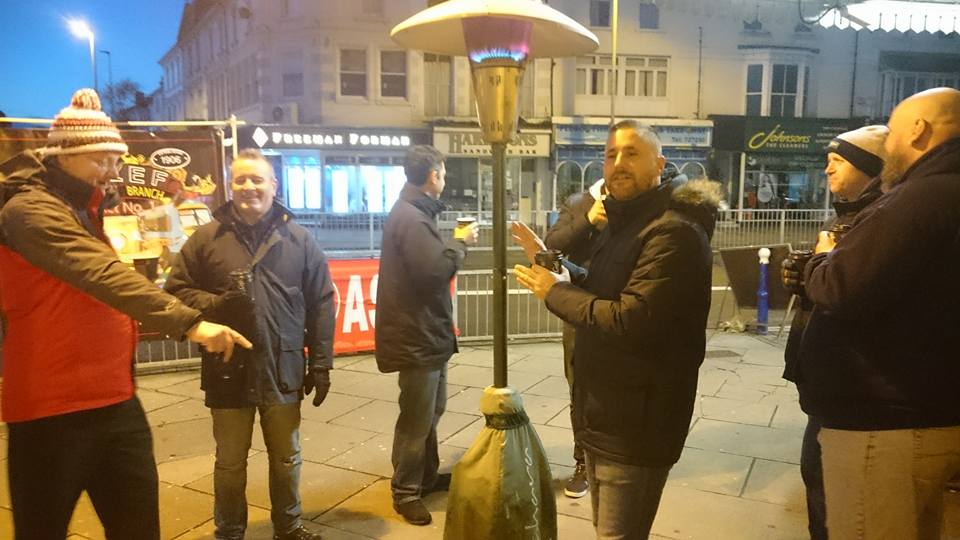
Harry McCormick Collection
LOCOMOTIVE JOURNAL
MARCH 2017
A.S.L.E.F. and Southern
A.S.L.E.F. drivers on Southern Railways rejected in a referendum a proposed resolution to the long-running dispute with the company. The following question was put to members. Do you accept the proposed agreement on driver only operation and related issues on G.T.R.
Southern services?
The result was Yes: 317 (45.9%). No: 374 (54.1%). Papers despatched: 953. Papers returned: 693. Invalid papers: 2. Papers to be counted: 691. Turnout: 72.7%.
Mick Whelan, General Secretary, said: ‘We understand and support the decision arrived at
democratically by our members and will now work to deliver a resolution in line with their
expectations.’
The result of the referendum was announced on 16th February – papers went out on Friday
3rd January and had to be returned by 10 a.m. on Thursday 16th – and the union went back
into talks with the company on Tuesday 21st February.
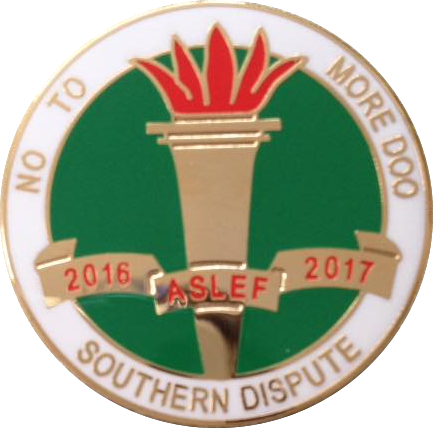
PHOTOGRAPHER UNKNOWN
LOCOMOTIVE JOURNAL
APRIL 2017
A.S.L.E.F. and Southern
A.S.L.E.F. drivers on Southern Railways have been asked to vote on a proposed resolution to our long running dispute with the company. The following question was put to members.
‘Do you accept the attached agreement between G.T.R. and A.S.L.E.F.?’
Ballot papers were sent out on Thursday 16th March to be returned by Monday 3rd April.
LOCOMOTIVE JOURNAL
MAY 2017
A.S.L.E.F. and Southern
A.S.L.E.F. drivers have rejected a proposed resolution to the long-running dispute with
Southern Rail.
The following question was put to our driver members employed by the company. Do you
accept the proposed agreement on driver only operation and related issues on G.T.R.
Southern services? The result was Yes: 346 (48.2%). No: 372 (51.8%).
Papers dispatched: 953. Papers returned: 718. Turn out: 75.4%. General Secretary Mick
Whelan said after the result of the referendum was announced on 3 April: ‘We understand
and support the decision arrived at in a democratic vote by our drivers and will now seek
new talks with the company and will work to deliver a resolution to this dispute in line with
the expectations of our members.’
Andy Bindon of G.T.R., Southern’s parent company, said:’It’s a hugely disappointing outcome
for our passengers, particularly as the agreement carried the full support and
recommendation of the A.S.L.E.F. leadership. We have shown a willingness and desire to find a solution to the dispute and we will now, once again, sit down with the union, understand the issues which led to this regrettable decision by the drivers, and try and find a way forward to resolving it.’
Grayling’s aim to de-staff the railway
District 1 Council Secretary
STEVE RICHARDSON
welcomed Andy McDonald to Waterloo
DISTRICT 1 Council warmly welcomed the Shadow Transport Secretary, Andy McDonald,
to our March meeting at Waterloo Action Centre. Andy, who spoke at AAD in Aviemore last year, said he felt he knew us all and was impressed by the way ASLEF meetings are conducted. The Middlesbrough MP’s visit coincided with important Commons business, so he dashed over from a debate on climate change and had to rush back for the afternoon session; but his visit was much appreciated.
Andy said he had mostly been occupied by the issue of DOO and realises how important the
dispute on Southern has become.
He feels the debate has been misrepresented in order to achieve Chris Grayling’s intention of de-staffing the railway, saving the Exchequer billions of pounds, and realising the Tories’
ambition to weaken ASLEF’s ability to adequately defend our members.
In his view support for freight is crucial not only for our members facing redundancy, but for cutting back on road congestion and improving air quality.
Andy emphasised the point that guards are a crucial element of keeping our trains safe, not
only from an operational point of view, but also by keeping the public safe from anti-social
behaviour, and helping those with disabilities.
He recognises that our rail network is a vital element of the UK’s national infrastructure and a fully integrated public transport system is essential. He reiterated Labour’s pledge to bring the railway back into public ownership and said he will continue listening to and working with the rail unions.
LOCOMOTIVE JOURNAL
JULY 2017
2017 A.A.D.
Bringing them back to the negotiating table
E.C.No.1 Marz Colombini brought delegates up to date on our long-running dispute with
Southern Railways.
‘Our dispute with Southern is a dispute with Southern Rail. It’s not about bringing down the
government – despite what a few badly-informed Tory backbenchers like to claim – and it is
not a dispute designed to undermine the GTR franchise. It is not a dispute in support of
another trade union or another grade. It was, and is, an industrial dispute over imposed
changes in our terms and conditions.’
Headded:’The purpose of industrial action is not to indiscriminately damage an employer but to put them under pressure to come to the negotiating table when they would not otherwise come to the table. Which is more or less where we find ourselves at the moment.’
Peter Scott, Horsham, said: ‘We don’t seem to be working to get this back together. My
daughter is a guard and a member of the RMT. Told “Become an OBS or lose your job.”
Conditions at Southern are toxic. There’s mistrust between the drivers and the conductors and the company. And our relationship with the RMT is not in a good place.’
That prompted Gary Comfort, Jubilee Line East, to say: ‘The relationship with the RMT on
the Underground is toxic. They nick our members, report them, disciplinaries.’
LOCOMOTIVE JOURNAL
JULY 2017
It’s easy as 1-2-3 do-re-mi, A-B-C
GREGOR GALL, professor of Industrial Relations at the University of Bradford,
looks at the opportunities afforded by protests
organised by the Association of British Commuters
against the Conservative government and
Southern Rail
COULD it now be as simple as ABC? That is a question for ASLEF and the other rail unions in the light of the founding, by disaffected Southern Rail passengers, of the Association of British Commuters. For years, campaigns to properly fund and regulate the rail industry, with the ultimate aim of a return to public ownership, have lacked the ability to act effectively in concert with the travelling public.
Because, until now, the travelling public has been unorganised and atomised. Passengers
grumble – often using expletives – when trains break down, signals fail and leaf mulch gets
too much. But then they get off the train, get on with their lives, and put it all behind them
until the next time. And so on, and so on.
But one group of passengers has decided to buck this trend. Arising out of the still continuing disaster that is Southern Rail, run by Govia Thameslink Railway, a passenger lobby group called the Association of British Commuters was formed in September 2016 after months of delays, cancellations, and overcrowded conditions, with short-staffing and strikes compounding these problems.
DIRECT ACTION
The old bureaucratic ways by which the rail users’ consultative committees and rail
passengers’ councils used to operate were thrown out of the window in favour of direct
action. For the last year, rail users and local campaigners came together to organise protests,
initially at Brighton and London Victoria stations.
With the success of these protests, the #SouthernFail campaign was born. Then, in December, the ABC organised a large demonstration at Victoria, calling for the resignation of Transport Secretary Chris Grayling. They marched to the Department for Transport where they called on the government to intervene in the dispute, and for an independent inquiry into the shambles at Southern.
Stephen Joseph, executive director of the Campaign for Better Transport, believes the ABC
represents ‘a new type of passenger lobby group organised by young professionals who are
adept at using social media’. Currently, theABC has 4,000 Twitter followers and some 1,500
friends on Facebook showing it has a bigger reach than these numbers alone suggest. Indeed, it crowd-funded £25,000 to launch a judicial review of decisions made by the DfT and the government over Govia and Southern.
Out of all this, the ABC has established itself as a non-profit company to represent the
interests of the travelling public. So it
(i) campaigns for a safe, affordable, accessible and reliable transport system – not only in the south of England, but right across Britain;
(ii) provides an online community for discussion by members, volunteers and partner
campaigns;
(iii) seeks to build greater public understanding of the issues surrounding the Southern Rail
crisis, as well as transport issues around the country; and
(iv) wants to elevate the voice of the commuter to be heard in Parliament and the national
press, while exerting pressure on key organisations in the rail industry.
MANNA FROM HEAVEN
After the announcement of the snap general election, the ABC said ‘there [wa]s no better time for... restat[ing] the demands we’ve been making throughout the Southern Rail crisis.
We will be addressing all former and prospective MPs with these demands and requesting their full response – so we can tell you which candidates have the best positions on Southern Rail’.
And it called for an independent public inquiry into the relationship between Govia
Thameslink Railway and the DfT; the return of guaranteed assistance for disabled passengers on services currently branded as Southern Rail – best achieved through the ‘guard guarantee’; the immediate removal of the Southern contract from GTR; and ‘passenger representation in any solution’.
So the ABC represents a positive development in terms of passengers getting themselves
organised. But, before anyone concludes that this is manna from heaven for the rail unions, a
few issues must be pondered.
Given that it has taken one of the longest and most intractable industrial disputes on Britain’s railways to bring ABC into existence, one has to ask – somewhat gingerly – if that is what it will take to get the travelling public organised in other parts of the country in order to make the ABC a genuinely national organisation. One hopes not.
FLASH IN THE PAN
Next, it’s possible the ABC will prove to be a ‘flash in the pan’ and peter out of existence if,
as and when the Southern franchise is sorted out. Once the anger is gone, the momentum and mobilisation will go too.
And, finally, while the rail unions could make common cause with the ABC over increasing
rail fares, understaffing, and safety issues, etcetera, there will also be times when the likes of
ASLEF will be in danger of falling out with the ABC. Most obviously, over industrial action
in support of a pay claim.
So, while alliances with passengers should be sought, it’s worthwhile not seeing the ABC as a magic panacea. The return to public ownership by a Labour government must remain the key priority. And that opportunity may come sooner than we think given the Labour advance – and Tory meltdown – on 8 June!

LABOUR LIST SOCIAL MEDIA
16th NOVEMBER, 2017
After 18 Months’ Myths, Let’s Set the Record Straight
On Southern Rail
By Mick Whelan
Aslef drivers on Southern Railways voted overwhelmingly this month to accept a proposed
resolution to our long-running industrial dispute with the company – 731 (79.1 per cent)
voted yes to the deal while 193 (20.9 per cent) said no, on an 87.1 per cent turnout.
We are pleased that our members, after careful consideration, and long and very hard
negotiations, voted to accept this deal which works for the staff, and the company. We now
look forward to working with Southern to restore good industrial relations and deliver the
service that passengers in the region deserve.
The resolution to the dispute, which began in April last year – when the company sent out
notices to our members saying it intended to introduce new working practices, without
consultation or negotiation, four months later – dealt with three separate issues of driver-only operation, terms and conditions of employment, and pay.
The agreement means we will have a second safety-trained person on every service covered
by the agreement except in very exceptional circumstances. That person will have all the
relevant safety competence, including the skills necessary to evacuate passengers in an
emergency.
It confirms the terms and conditions under which our members at Southern are employed –
T&Cs which were ripped up by the company last year.
And the agreement gives our drivers a 28.5 per cent increase in pay over the next five years,
covering the pay settlements due in October 2016, albeit a year late, 2017, 2018, 2019 and
2020, providing a structured five-year deal through to the end of the franchise.
There’s been a lot of misleading information about our agreement, so here are the facts:
Aslef has ensured that no additional trains on Southern will be rostered without a second
safety-trained member of staff.
Aslef has ensured that no additional trains will run without a second safety-trained member of staff on board except in very exceptional circumstances when all other options have been
fully exhausted.
Those circumstances are:
- late notification (defined as less than two hours before booking-on time) of sickness or the granting of emergency leave of absence at the start of duty;
- when the second safety-trained person is displaced by service disruption, late running and/or driver/OBS error from misreading diagrams or being left behind on a platform;
- when an OBS is unable to continue duty having commenced the booked diagram, through sickness or having to leave the service to assist with a customer service incident or emergency.
In all these circumstances, arrangements must be made to restore an OBS to the service at the earliest opportunity.
Aslef has ensured that all second safety-trained staff across the franchise are permanently and directly employed.
Aslef has ensured that more second safety-trained staff will be recruited. So jobs have been
created. Not lost.
The resolution accepted by our drivers on Southern Rail applies only to that company and
that franchise.
This deal is company-specific and does not have implications for any other train operating
company on Britain’s railway network. Since the break-up of British Rail, and the
privatisation of our railway, we have negotiated on a bi-lateral basis with each company and
that is what we have done here.
After one-and-a-half years of industrial strife we wanted to find a way forward for our
members who work on the railway in this region, for the passengers who use Southern trains, and for the businesses which depend on the service. This deal is a resolution to a dispute, not a template for Britain’s railway in the 21st century.
Mick Whelan is general secretary of ASLEF, chair of the Trade Union and Labour
Party Organisation,
and a member of Labour’s national executive committee.
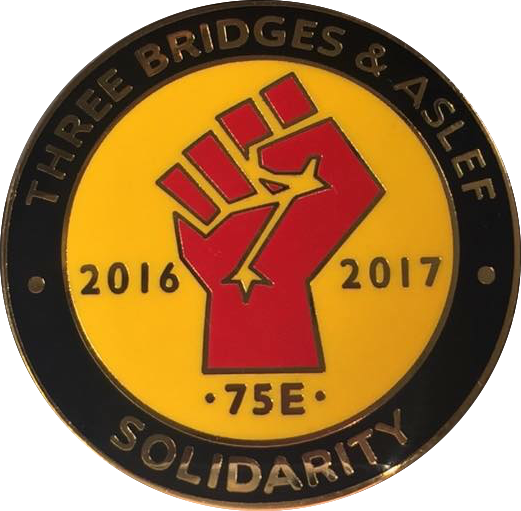
THREE BRIDGES MEMBERS BADGE
LOCOMOTIVE JOURNAL
DECEMBER 2017
A.S.L.E.F. drivers vote yes to Southern deal
A.S.L.E.F. drivers have overwhelmingly voted yes to a proposed resolution to the long-
running industrial dispute with southern railways – 731 (79.1%) voted yes and 193 (20.9%)
voted no on a turnout of 87.1%
Mick Whelan, General Secretary, said: ‘our members on southern, after careful consideration, and long and hard negotiations, have voted to accept this resolution to our industrial dispute with the company. We are pleased with a resolution which, we believe, works for the staff, and the company, and we now look forward to working with southern rail to restore good industrial relations and deliver the service passengers in the region deserve.’ The resolution to the dispute, which began in April last year (2016), dealt with three different issues – driver only operation, terms and conditions, and pay.
‘The agreement means we will have a second safety-critical person on every train covered by this agreement except in exceptional circumstances. That person will have all the relevant safety competence – including the skills to evacuate passengers in an emergency.
‘The agreement also confirms the terms and conditions under which our members at southern are employed.
‘And the agreement gives our drivers a 28.5% increase in pay over the next five years. it covers the October 2016, 2017, 2018, 2019 and 2020 pay settlements, dealing with our outstanding pay claim, and provides a structured five-year deal through to the
end of the franchise.’
The resolution accepted by our drivers on southern applies only to that company and that franchise. ‘it’s important to stress that this deal is company-specific and does not have implications for any other train operating company on Britain’s railway network,’ said Mick. ‘since the break-up of British Rail, and the privatisation of our railway, we have negotiated on a bi-lateral basis with each company and that is what we have done here.
‘After one and a half years of industrial strife we wanted to find a way forward for our members who work on the railway in this region, for the passengers who use Southern Trains, and for the businesses which depend on the service.
This deal is a resolution to a dispute, not a template for Britain’s railway in the 21st century.’
Taking toilets off our train
Southern rail say they are trying to ‘improve the service’. let me remind you what Southern’s idea of improving the service for passengers is. they now run trains between Brighton and Portsmouth with no toilets on them. When challenged they said people can get off the train and use the toilets at stations. But most stations have locked their toilets because of vandalism.
Southern say ‘ask a member of staff to open them for you’. unfortunately, another of
Southern’s great ideas for improving the service is to remove staff from lots of stations.
Keith Wells
Brighton
LOCOMOTIVE JOURNAL
JULY 2018
A.A.D. 2018
Southern comfort